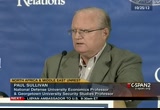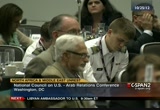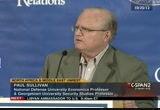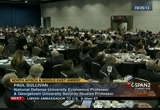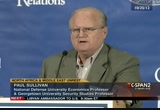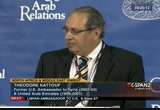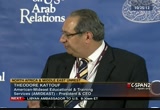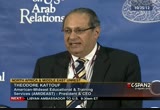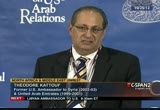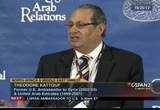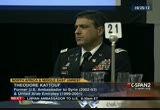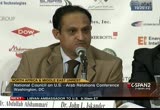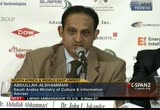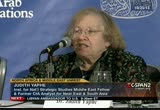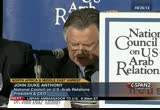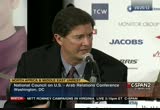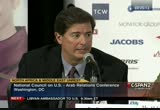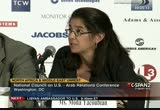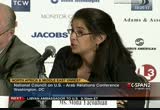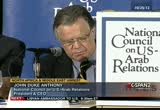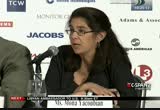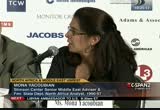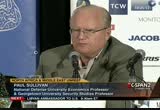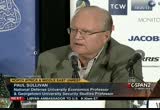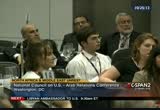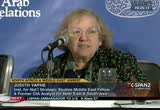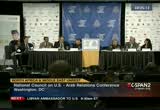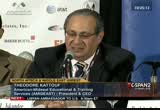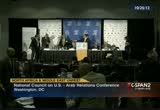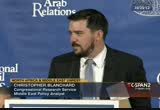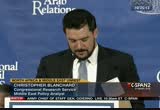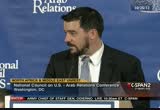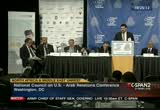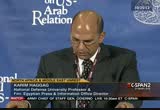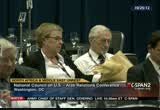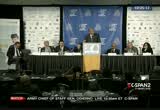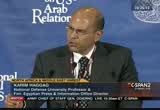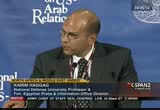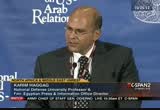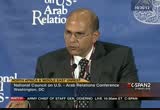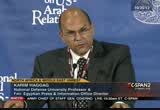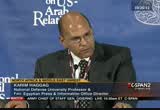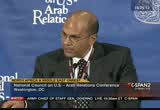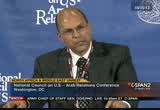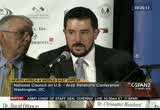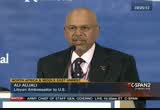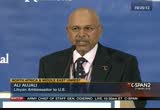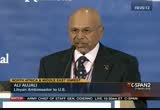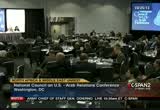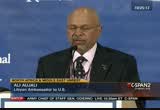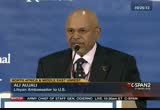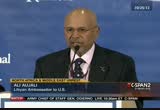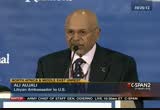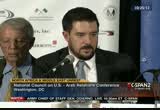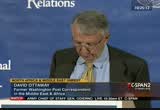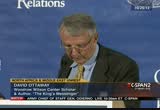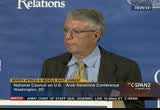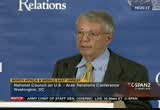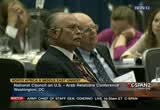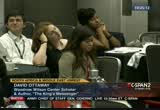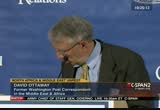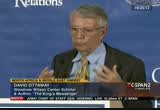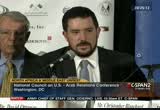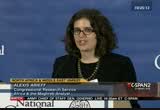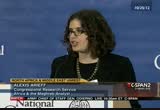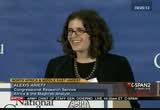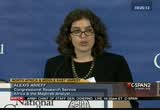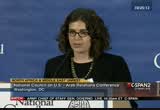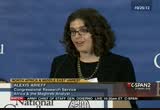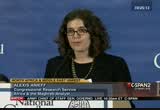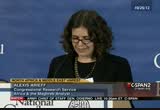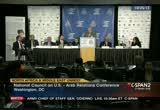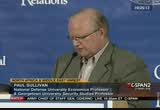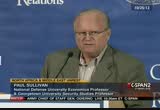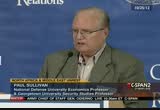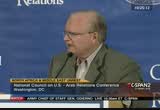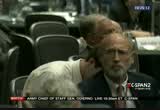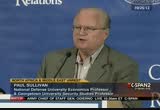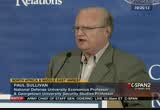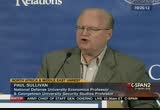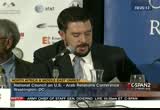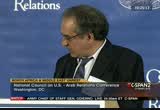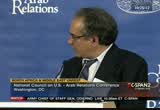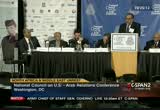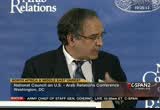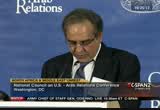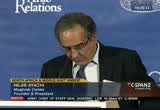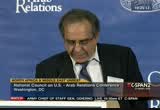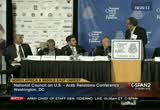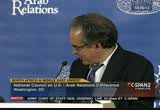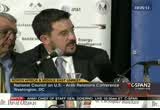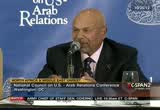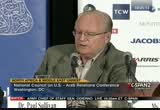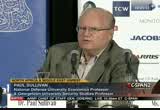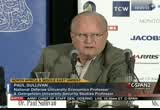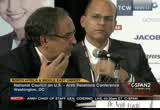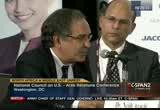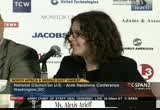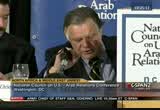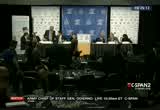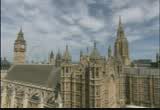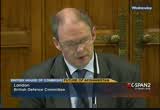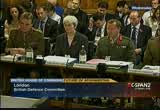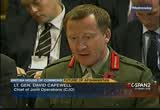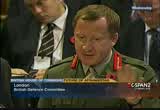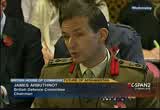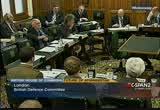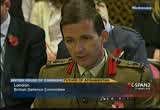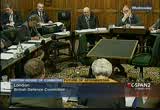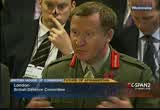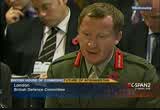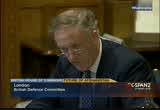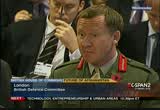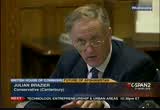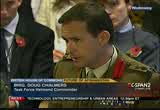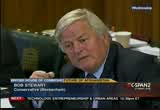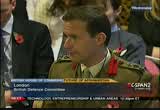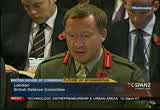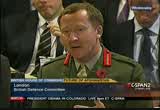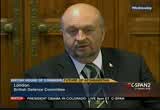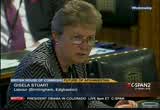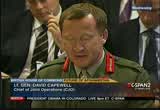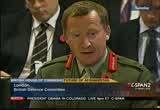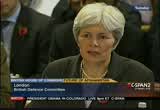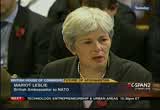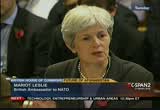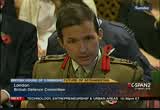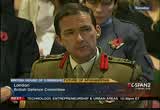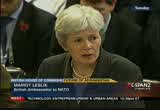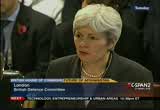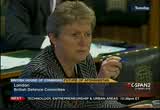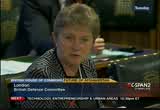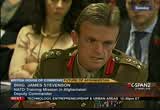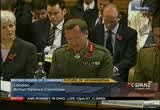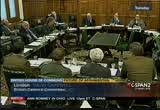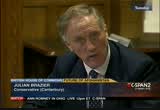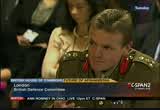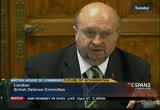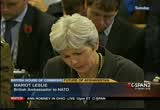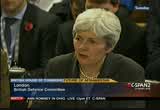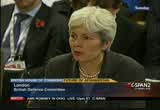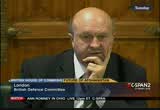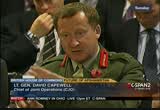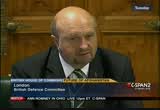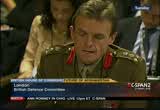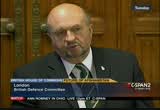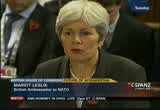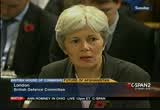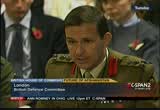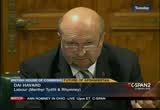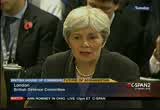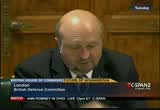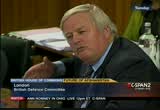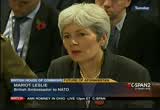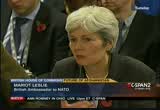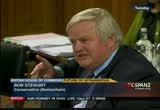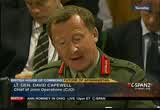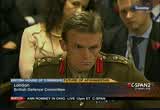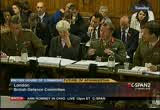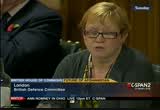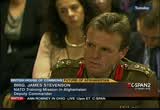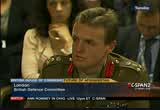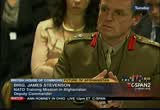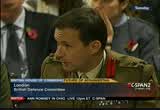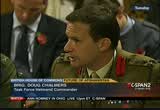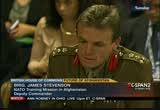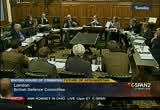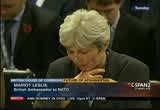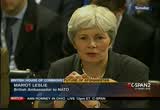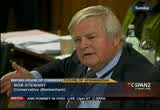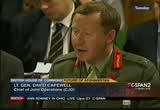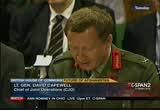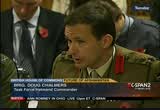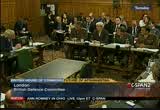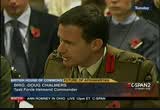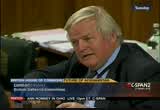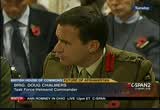tv U.S. Senate CSPAN November 1, 2012 9:00am-12:00pm EDT
9:00 am
it's difficult. they could be very lengthy. and to have effectively used, you need to have a credible threat of violence along with it, in order to get people to the table and to listen. if we're just going to use soft power and niceties, nothing will be done. it is indeed a whirlpool. the turks certainly near the border are fed up with this. off and on. erdogan mentions baby will go to war, maybe we won't. it's right on their border. the turks brought the military to the border to send a signal. this good kicking to in article five, nader. now, that would be quite a mess. and, of course, the russians have their only naval base
9:01 am
outside the former soviet union in syria. ladies and gentlemen, the russians are a very big part of this problem. i would not assume that the united states is the main issue here. if the russians and the chinese play ball on this, this could've been resolved a long time ago. but my sense is pessimistic. my sense, it's probably too late to put humpty dumpty of syria back together again. it has festered too long. all of this time that something could have been done, pretty much nothing was done except to make the situation worse. all of the talk in the united nations, and elsewhere, and the
9:02 am
talk of a cease-fire, these are not solutions. this is talk. it's too late. it's too unclear. it's too fractious. how many in this room could name the opposition? how many in this room have a clear view of who the opposition is? or will be? on a danger to the united states, to the gcc and others? do we know this? are we going to hand weapons to them? i remember a reporter from "the wall street journal" asking me as the revolution was going on in libya, whose the opposition, do we really know who it is? well, my answer was at that time no. and guess what, we're still getting surprises. one of the surprises happened on september 11 victims a very unhappy when.
9:03 am
to have soft power anything worth in a situation like syria you have to have coalition. i will be very frank and going to say, as judy did, a caveat. i'm just speaking my own opinion, not the u.s. government, because i'm about to hammer them. we do not have the kind of leadership that required to have coalitions put together to deal with this situation. it is a soft power or hard power. and it may not happen properly anytime in the near future your remember that caveat. now, the other day i was reading through a book by save the children. it's about the children of syria. and if you haven't read this book and you want to understand what's happening in syria, i recommend you read it. but i assure you, you will feel very uncomfortable on page one. there are costs involved with the situation that could go on
9:04 am
for generations, not just for now. generations. think about the children are going through now and how they will think about the west. the international community, their arab brothers, the reins, the russians, the chinese, the united states, and just about everyone else. even if this might be over in the next year or so, it will definitely not be over for those children. thank you. [applause] >> thank you. ambassador? >> i agree with most of what i heard from our panel today. although not surprisingly i don't agree with everything. i think professor david lesch has great insight into bashar al-assad, and i agree with this
9:05 am
analysis of the man. i think he came in thinking he could shake the regime, and instead he became a creature of the regime. you know, comparing him to michael corleone, he gives them too much credit for his savvy and his smarts. but in one sense he is like michael corleone because he came and believing he could reform an incredibly corrupt and truly mafia like system, and he found it very quickly that he was, if you was to remain in power he couldn't do it. and we can speculate whether he wanted to take a softer approach than some of those around him like his late brother in law or his brother, but it really doesn't matter. it's in material. we see the situation. we know what it is. and it's going to continue. i think increasingly there's a consensus at what the situation
9:06 am
is in syria and what some of the pitfalls are. you know, i think there's much more realism now than there was a year ago. about what's going on in that country. and much more sober assessment on the part of u.s. officials and others as to what can and can't be done. certainly, being a former diplomat, you would not be surprised to find out that a belief that this, we should be leaning a diplomatic effort. but i'm not a fan of those who want to blame america for the situation, or blame american action up to now for the terrible deterioration that has taken place. remember jeane kirkpatrick at a republican convention, i think we nominating ronald reagan, excoriating the democrats are also the blaming america first.
9:07 am
i would say to our arab friends, you have to be careful, too, because first we were to present in the middle east, and i would agree with that, now the charges were absent in the mideast. effect of the the matter is that a number of syria's neighbors have different interests and are pursuing their interests in different ways. it's very hard to pull together a coalition of the friends of syria, and give it to be effective, but we have to try. i, like others, i don't have much hope for iran. in fact, i have no hope for iran as it does help with with all of us. but as bad as putin in the russians had behaved, i don't think we can give up on russia because they do know the syrian military there in getting bashar al-assad out of the country is not going to solve all the problems. if he leaves, particularly if he
9:08 am
were to leave tomorrow, let's say, you would have fragmentation in syria for both sides this is an existential struggle. and alawite dominated army is not going to give up because bashar gave up. and the competition is not going to lay down their arms because bashar less. so i think we very much, if there's going to be any hope for resolution that keeps syria impact for the time being we need the russians, and we need putin, and we need them to recognize that their nihilistic attitude right now doesn't play well. and i would suggest that a number of countries might do better by putting pressure on russia rather than excoriating the united states. i do believe in military intervention. i think we could very well find ourselves backing one side and
9:09 am
then only to find that we're incapable of stopping them from occurring the other side if they defeat them. we've seen enough massacres in syria. i'm afraid to be more but we certainly should not be a party to it. oh, i think there is no near-term solution. it's an ugly, terrible, horrible situation. it's going to continue whether or not bashar al-assad leaves power tomorrow or not. and the united states needs to, particularly after the election, when there's less doubt about who is leading this country abroad come including among the russians, we need to continue to work on diplomacy, south tower service, humanitarian aid, good intelligence on the opposition, all of that. but we have to recognize that we don't have the key to the
9:10 am
solution. [applause] >> thanks to each of our speakers. i was going to ask if any of the panelists wanted to respond to their fellow panelists. i think i'm in particular we've seen very strong divergences on a potential role for the united states in syria. i think, although the details of that half i think yet to be flushed out for the count as well as for others. so that would be one thing and if anybody wanted to respond to, to that issue. does anybody have, on the panel? would you like -- okay. >> i just assumed they were indirect -- [inaudible] why they didn't interfere.
9:11 am
we are not just blaming, maybe we were expecting too much from united states. also, in the same time i am sure that syrian issue now, because i'm coming from the turkish border, syrian and turkish border, it has become not just for jordan or for israel or for iraq, it is real threat for region security, and that might be one day like maybe yemen. even american interest. so we are not just blaming united states just because we are friends. it is real. i want, therefore, three times, you know, syrian turkish border. educate imagine how much is becoming a regional threat for the security region. the second thing i think united
9:12 am
states past -- you're always talk about human rights supporting democracy, supporting kids rights and human rights. what about the serious? now, i really was crying when i was sitting the kids going to school for two years. and they might be terrorists. so my last comment is what is the incentive for, if you are just going to -- [inaudible] and i am sure those will not be good news for united states. >> i think one of the things that we haven't heard at all here, and yet should be uppermost in our minds is what went wrong with iraq, is what happened the day after. it's what you think about how you defeat bashar or getting to be part of a negotiated solution, fine, but i think one of the most telling comments was that, that it could end, this
9:13 am
crisis could into more but the effects of it will linger on. you don't in the blood feuds and the killings and violence and the factions and everyone goes home happily ever after. and here i would look, for example, the u.s. i.t., project on syria the day after. what do you do with civil service can what you do with and how to make it save the day after so serious can't determine where they go next. haven't talked about that. >> thank you. >> we have some written questions handed to us. in terms of empathy again, we talk about the 300,000 refugees and the larger number still displaced individuals. would anyone focus on the syrians who worked for the
9:14 am
state, if there's regime change, that's one thing and but those who work for the state, namely those whose entire livelihood comes from there being a postmaster or trash collector -- or any of the other industries, and whose entire material well being standard of living is linked to the state. it seems as though no one focuses on them. if you take the numbers of killed and the refugees, external and displaced, those numbers are but a fraction of, say, the 3 million who work for the syrian state. anybody care to comment on that dynamic and dimension? it can't be wished away. >> i'd like to.
9:15 am
that's a great point. the so-called silent majority have yet to be heard from. again, many of these people just simply trying to stay out of the way. many who don't necessarily like the regime of bashar al-assad but don't see any other viable alternative, which is one of the reasons why perhaps early on in this uprising in international attempts, and there were attempts and maybe an impossible task to try to carve together an opposition that has a vision for the future that's more inclusive that offers is viable alternative. again, maybe an impossible task from the beginning to i was doing my own mouth to all of this, and it is a country of about 22 million people. let's say there are two, 3 million people that are supported to more or less a degree of the regime. the amount of fighters, certain fighters, and the, 100,000 would
9:16 am
be generous right now but let's say there's 3,500,000 let's say there's 1 million actively supporting in terms of medical support and moving supplies and so forth. we have 4 million, maybe 5 million. so they are 17 million if my math is correct. many our children of course you don't have, many of your just try to survive with their parents but there are many, many millions, the majority who really have been heard from and to our saying -- staying as best they can on the sidelines. and where they go and how they see this, and what they see, the regime is not necessarily going to be gone tomorrow. it certainly, both sides think they can still win. and many people think that the least worst alternative right now is the continuance of the regime itself, in some form. and that's something that hasn't been talked about.
9:17 am
and this is one of the big failures of the opposition, as many have said on the panel is divided on so many fault lines. and fault lines within fault lines. that is very hard to offer themselves up as a credible alternative to many of those who are in the silent majority. >> i think i would really does add frankly to it david said, and i think to judy's point about the lessons learned from iraq. and i think the notion again that one has too tried to envision a syria in which the structures of the state are, in fact, still preserved, i would differ with david about assad and those around him staying on. i disagree with that point. i don't think that is tenable. given the blood that has been spilled her but i do think it's essential to have a solution that does try to maintain the integrity of the structures of
9:18 am
governance such as they are, and security in c. but i'd also like to make another point. and that is, i think the notion that the u.s. is somehow responsible, or that it is the u.s. job to unseat the assad regime, i think i would push back against very forcefully. and i think it's important to underscore that what's happening in syria is happening as part of a much broader phenomenon that has engulfed the region of homegrown organic change. president obama made no promise of unseating the assad regime. i think the u.s. is rightly out of the regime change business. and i do think that in order for syria to have a sustainable, peaceful transition, it has to be one that comes from within. and here i to put more responsibility, quite frankly,
9:19 am
on the opposition to do a much better job of attracting minorities, christians, druze, alawites, kurds, and to coalesce around a quote vision of a post-assad city in which these minorities feel not only that they would survive, but that they would thrive. >> john, if i can ask for questions requested, and anybody can try to answer them. how would a variety of possible future serial look at separatists and other extremist anti-statist quote groups attempted to and succeeded in dividing syria into multiple political entities, if not new countries? how, given these kinds of possible scenarios might one rank these yet to be achieved or yet to be attempted alternative, alternate maps of syria or of
9:20 am
probability? number three, how, if at all, does israel stand to gain from the conflict in syria? and lastly, how, in light of persistent attacks on iraqi american and other security forces, in iraq, contract security forces on the american side, can one envision iraq regaining the degree of national sovereignty political independence and territorial integrity that it manifested prior to the american-led invasion and occupation? john, do you want to choreograph the response? >> why don't we just, we will start with moan and work our way down. >> i'll just take a stab at that first question because i think it's a very important one. and it is that as we contemplate various scenarios in syria, the notion of a series in which the
9:21 am
regime implodes or in someway collapses and we have a country that becomes segmented or divided along sectarian and ethnic lines is, i would argue, very much a possibility. i don't foresee borders being redrawn or statelets started, but i think to going over to borrow david's phrase of the lebanon as a nation of syria, i think that that's actually quite possible. that one sees various groups retreat to their ancestral strongholds. and you see a syria that really is for many, many years beholden to a conflict. the one last comment i would make is as i'm watching what happens in syria i am increasingly struck by the notion that we may be seeing the unraveling of the post-ottoman
9:22 am
era in the labonte. and that that has huge implications, not only for syria but for the region more broadly. this is a part of the world that is really on its own, never been able to reckon fully with its minorities and how, as arabs, they would like to govern. and i think that's a huge question that will be coming in the months and years ahead. >> getting back to the question of the post assad, i went to given after that as well. but i think one lesson that some may have learned almost by accident about iraq is you do not find the people who know how to run the electrical stations, a water glass, the refiners, edges but everything else. that makes absolutely no sense but you want to keep them on.
9:23 am
they will be great tensions within the country if these people are still running it, but i'm also an energy person as was the middle east person. it takes a long time to train people to know how to run these things, or to work them for fixing but if you just pulled out of the factories you going to have a collapsing economy that will drag it right back into instability. this is going to be a very difficult trade off. with regard to the country splitting up, lebanonization, i would hope that would not happen. if there is a kurdish group in the north that wants to separate out, i can pretty much assure you that turks would not be welcoming of that concept. so that might cause some difficulties. there may be some warlord for a while, the brutality of assad kept things in check for a long time. what would israel gain from a conflict? as far as i can see, it's losing on all sides on this one.
9:24 am
it's in a very insecure area. much more than at any time in its history. >> that the organization if you of this region is something which -- from is a lot of people see different patterns. for example, with iraq breakup to a sunni stand, as she is down? and yet you think about iraq being arabic, not sunni but it's hard to see the kurds have a lot of ambition and the absence of power, the absence of the state encourages kurdish ambitions both in iraq as we see when baghdad collapse, certain terms of what's happening in syria. i think that the strategy for both, whatever government follows in damascus with similar to what saddam was to keep you take your the first problems for it. the curtain of the highest award and you get around to them lead.
9:25 am
and things are collectively they were before. it is a high risk, but it's hard to see a total, what, three division if you look at in terms of the ethnic and sectarian differences but it's not all about religion. but it's about the complicated layers which makes up the region. the question about iraq, can it or will it regain? is already there. part of the problem in terms of what the government in baghdad is trying to do, it doesn't matter if it's malik your anybody else. he believes in a strong central government. certainly stronger than the constitution which is very weak. and was written by shia and kurds who said never again to a strong central government. but you have a government that functions that can protect the country inhabit as weak as it is and not be able to defend its borders and to project national power. so there are people, and the indy i surveyed that was a pulitzer but that was published in april or may says that
9:26 am
maliki, love him or him from a certain more popular than he was six months ago. and his popular including among the sunnis and others who see him, not the election, they, they don't have to like them, it's not a popular to contest. i think the iraqis know that. but they don't know who else is there, and he has taken strong moves to defend him and the country. he who delivers at the end of the day is the one who is going to stay in power right now. it's not a perfect system but iraq is a work in progress. but i think to say that it doesn't have its control of it -- it has its borders, its territory continues to control the against its neighbors, and it doesn't have that now. that's why i try to frame a series of choices in a way that iraq has to make choices to what can best do to acquire what it needs to defend itself. and that may be staying with assad or not. >> the remaining answers, if
9:27 am
they could keep their responses to one minute. >> okay, i think there is a great irony, particularly during the lebanon war, it's been a doctrine of the baathist regime in syria that is zionists wanted to fragmentation of the labonte sectarian and religious lines to lend greater legitimacy, presumably to a state that was based on either judicial ethnicity or religion, take your pick. and, in fact, it might be the alawite dominated army that is forced to fall, that is forced to concede great swaths of syria to one or another group among the opposition and fall back on damascus and the coastal mountains and let a key along with the christians. et cetera. and as woods said, these fault lines, these religious and ethnic fault lines encompass
9:28 am
lebanon, syria, iraq, bahrain, and overlaying all of this is a rivalry between the gcc and iran. for predominance in the region. so as i said, there is i think unfortunately, i think that fragmentation, at least temporarily is a very possible if not probable outcome of what we are seeing. >> well, i think we've been reminded both of the human reality, serving in the case of syria but also in iraq of what's happening, they need or policy, the difficulty of the choices. thanks to all of you for being here. thanks to dr. anthony and the national council for hosting this. [applause]
9:29 am
>> more now from annual conference at the national council on u.s.-arab relations. the group last week drove the living ambassador to the u.s. for more than an hour. >> ladies and gentlemen, we are about to begin. would ask you one more time, please, to take your networking conversation out into the atrium as we will begin our session. at this point on i'm going to call chris from the congressional research, who is the chair of our session here esther blanchard. >> -- mr. blanchard. >> hello, everyone. if you could please take your seats we will get this them may
9:30 am
be an ultimate or ultimate penalty i know it's been a long day, and we will appreciate your attention for this insightful and hopefully thought-provoking and on arab north africa. the current of change that so sweeping to the middle east had its humble beginnings and the subregion that this panel will address, arab north africa. the expenses of countries on the southern shores of the mediterranean, offer competing visions of the course that change may take in the broader region. in tunisia, we find an elected coalition government face with security challenge. and debate over fundamental constitutional principles while economic struggles that help motivate original call for change continue. in libya, trident and tragedy have marked a transition that is success of produce libya's first elected government in nearly 50 years. but yet libya remains haunted by the ghost of the gadhafi era, it's divisive legacy and its new government has a long way to go to build its own capacities and a certain national leadership.
9:31 am
egyptians have taken the first step beyond the political view that characterized their transition period. but president morsi and their allies find and subscribe with responsibility for power and balancing can international finance. and algeria we see their ability of broad-based forms but limited ship transition and persistent economic challenges may place obstacles on the horizon. and lastly in baraka, with a potential model of negotiated change with many questions still outstanding about the limits of royal power and their ability to compromise with elected individuals. what do these different cases teachers about the possibilities of lasting change in the region? how does each shape the other? and how can policymakers respond to any challenges each present? indeed, north africa office of a rich menu of interesting topics and questions to explore.
quote
9:32 am
to help us do that we're joined by impressive panel of experts and practitioners that you see before you. and they are all eager to share their experience and insight. they are bios are available to you i will keep introductions to a minimum. in general, we will proceed, i think, east
9:33 am
office here in washington. so it offers a unique insight into the delicate relationship new leaders find themselves maneuvering in. mr. haggag, thank you. >> thank you, and i'd like to thank the council for this opportunity. it's a pleasure to be here with you today.
9:34 am
on the level of politics, the election of president mohamed morsi was truly a landmark event in egypt's political history. he was the first civilian elected to the office of the presidency in egypt. he is also the first islamist to be elected as head of state in any arab country in free and fair elections. and that the islamist movement in question of course is the most impressive by far, the largest and most well-established islamist movement in the world of political islam. so truly momentous change on the level of politics. however, i would argue on the level of policy, we have much more durability, much more consistency. and the reasons for that are numerous, and a don't want to get too much into that, of course can discuss this in the q. and a session but just to point out that this is rooted in
9:35 am
a number of factors. first of all, resiliency of egypt's institutions, the military and national security bureaucracy, a judiciary have all remained to a certain level very cohesive out what has been a very turbulent transition. now, all of these of course have afforded egypt really a measure of stability that's been lacking in some of the other countries and have undergone transition to we heard of course syria, we heard about libya, bahrain, all of these have went through very turbulence, turbulent domestic transitions. but i think the resiliency of each of these institutions have stared egypt for much of that. we still are of course very much any period of a medical transition. -- political transition. despite the election of president morsi 11 number of
9:36 am
milestones to complete in egypt's post-revolution transition. there is still a new constitution that is being negotiated as we speak. that constitution will be put to a national referendum, followed by parliamentary elections. now, and all of this of course we have seen what has been at times a very polarized, or polarizing debate within egypt's domestic context, between both islamists and non-islamist versus, forces the filled with the old regime and forces of the league with a new revolutionary groups that have emerged from the revolution. but there is still a recognition that consensus is key. i think there is a recognition that no party can govern by itself but there is a recognition that no coalition of forces conform a super majority
9:37 am
that can govern egypt in isolation from other political forces. so i think that's a very healthy sign, but again, it accounts for the fact that there has been no radical departures when it comes to egypt's domestic or foreign policy. and if the tests to what i think is a very healthy sense of political pluralism in egypt. now, the one area where we see this consistency most clearly is in the realm of foreign policy. we have the fundamentals of egypt's foreign policy orientations very much unchanged. the strategic partnership with the united states, egypt's commitment to the egyptian-israeli peace treaty, have all remained very much intact. contrary to widespread expectation following the overthrow of the mubarak regime, there has been no radical shift in egypt's regional alliances. there has been no option of
9:38 am
diplomatic ties to iran. there has been no drastic change in egypt's policy towards the hamas government in gaza, or the border regime between the sinai and the gaza strip. there is a recognition, i think, on the part of the government, of the need to leverage the network of relationships and alliances that egypt has formed over the last three decades to deal with what is a very difficult economic situation, domestically. and i will talk about that a little bit further on. so we see on the level of foreign policy much more consistency and much more durability and any sense of radical change, as was the expectation following the outbreak of the revolution. now, that does not mean that there will be no change. i think what you do see on the part of the new government is a
9:39 am
clear determination to reassert egypt's regional role that would seem to have been diminished under the former regime. we have seen a much more activist foreign policy on the part of this president with numerous visits to china, reaching out to europe, a visit to iran in the context of the non-aligned movement in reaching out to africa, giving egypt's interest there, egypt's water interests with the nile basin countries. we've seen a very bold initiative on syria that we could talk about further. we see a clear signaling to break with the old regime, when it comes to the perception of egypt's subordination of its national security interests to foreign powers. and this was a very strong perception generated by the revolution itself. in all of this i think the
9:40 am
approach of the new government will be driven by its clear sense of egyptian national interests, rather than any perceived ideological orientation. and one gary busey you see this most clearly is in the sinai. and the very decisive response by the new government to the crisis precipitated by the attack on egyptian soldiers last august led to the killing of 16 egyptian border guards at the hands of terrorist elements within the sinai. we've seen in the aftermath of that very clear, a very decisive response on the part of the government. the morsi ordering in the military, to track down in a very wide-ranging sweep of the border areas between the sinai and the gaza strip in israel, very clear action in shutting down the illegal tunnel trade between the sinai and gaza, all
9:41 am
of this were very decisive actions to the point that the government in gaza criticized president morsi, calling him worse than former president mubarak. now, in all of this i think the new government will face three key challenges, and i will wrap up very quickly. first of all, there is a challenge of repairing and rethinking new, or old relationship see this in particular in the african context, giving egypt's nation's security interests in the nile basin region. there will be a need to rethink egypt's relationship with the united states. i think both countries recognize the critical stakes in this very key relationship, but i think there is a recognition as well that moving forward much of the
9:42 am
substance of that relationship will have to be revisited in the way that takes into account the interests of both sides. finally, all of this will take time. it will take time for patient diplomacy abroad, and to will also take time to forge political consensus at home. now, the problem is of course we, or egypt lives in a region that is prone to crisis. and prone to crisis in a way that can intrude on egypt's domestic political context is a way that can force for difficult decisions for the government. we see the potentially in libya, in lebanon, in syria. a potential crisis in the gulf. the one area where it will probably face an immediate challenge is in gaza, and we've seen lately the recent sound of violence, rockets from the gaza strip into southern israel, a
9:43 am
cycle of retaliation and counter retaliation. egypt again, assuming its role in attempting to broker a cease-fire between hamas and israel, all of these things can potentially be explosive in a way that forces a very difficult decision on the part of the government. the last point i will make is about the arab-israeli context. i think one of the unrecognized developments so far when it comes to the arab spring is that the arab revolutions coincide with what is truly a fundamental transformation in the nature of the arab-israeli conflict. from a national conflict between palestinians and israelis, to what seems to be an emerging ethnic conflict between arabs and jews. the demise of the two state solution will post a fundamental challenge to egypt's interests and egypt's stability but that i think if there is one potential challenge that egypt will face
9:44 am
in the foreign policy realm, i think it relates to what will be a very difficult the government when it comes to the future of the arab-israeli conflict moving forward. thank you. let me stop there, and i would be happy to take your questions. [applause] >> thank you. thank you, karim. karim has presented us with a framework to understand egyptian relations that a train and the world, a bit more continuity than change and reminds us to focus on egypt's rethinking of its alliances, consultations, and warns about may be bumps in the road ahead on the arab-israeli conflict. we move now to libya, very much on everyone's minds are in the united states of late. and who better to present perspectives on the country and the living ambassador to the instead, ali suleiman aujali.
9:45 am
tran one service around the world and in libya gives a unique insight not on libya's recent political changes leading to keep her current challenges and opportunities for the living people as they look to the future. we are pleased to welcome trend one. [applause] -- tran one -- spent good afternoon. thank you very much. ..
9:46 am
>> i want to start with what's happening in benghazi and september 11th, that we lost a great friend. ambassador chris stevens, he's not only friend, he is a tennis partner, and he's a champion, and he's part of the revolution. we lost him in a very criminal attack against the american consulate in benghazi. i want to extend my condolence or regret and we're sorry for his family and for the american people. it is sad that he is not around with us to see the democratic process taking place in libya. when we have with support of the united states, of the nato, of arab countries to defeat the gadhafi regime which was in libya for 42 years. but the challenges are still
9:47 am
great in front of us. we have security issue. unfortunately, the government is still not under control of the libyan territories. we have borders, we have illegal immigrants, we have some terrorists, and we have some groups who are having weapons in their hands. how can we control them, how can we bring them under the umbrella of the governments? this needs two things; one, support of our friend, support during the war, and the second thing that we have to take this people as much as we can under an umbrella and of government. we need to train them, the one who are ready to work for the military or for the minister of interior, and we have to find -- [inaudible] we have to create job for them.
9:48 am
this is a very long process. it will take time and need patience. but unfortunate, the expectation of libya is very, very high. and this is without security, without security we will not be able to do anything. we need the security as much as we can. security is priority number one to libya. we need the american companies to come back as we cannot ask them to come back without the security. reconciliation among the libyan people, just last few days we still have a great crisis in one of the biggest city, one of the cities in libya which the national army have to deal with them. this is another challenge. we have to bring the unemployment down. it is more than 30, 35% among the young people. then this is all the challenge. we manage now to bring the oil
9:49 am
just about the level for the revolution, but libya is depending only on oil and gas, and i think this is not what we want. the diversity of our economy is very important. we have to attract the investment, and we have to attract the foreign companies to invest in libya. but as i said before, without security we will not be able to do that. reconciliation among our people, it is also a big issue. libya, it is a big country but with a small population with the tribes, with the history, and we need to build them. gadhafi, unfortunately, he used the tribes against each other for his own benefit. then the challenges are great, but also the promises are great. there are opportunities for the libyan people to build the country. the first thing we achieved is
9:50 am
democracy. now the election took place to elect the first congress in the libyan history since 1969, and there mr.-- [inaudible] was one of them. now he was elected a member of congress. libya now, they are enjoying the democracy. they're enjoying electing the people they want. but this, also, is not enough. the level, the standard of living in libya is very low. i am working for the government for 42 years. when i retire, my salary will be $400. i think it could not feed even a dog here in the united states. what about one with family to take care of them? creating the opportunities is very important. but i am optimistic because the people now, you see they are stand for their democracy, they are stand for their future.
9:51 am
and we have to, we have to be realistic for our expectation. but the government need to supply the service. education is need to be reformed. political systems need to be reformed. the economy need to be reformed. everything we -- gadhafi left for us just with destructions. in every libyan city you find what gadhafi left is destruction behind him. i want to tell you that we are confident, that we will achieve our goals. but we cannot achieve our goals just by what i am telling you now. the new government, the new prime minister was elected, and he has to present his government in the next few days. and this, there is a great respondent for the new -- respondent for the new, for this new government. i don't want the united states or our alliance or our friends
9:52 am
to lose confidence. i want them to be confident in libyan future. the libyans are very serious about their future. they sacrifice more than 25,000 young people and children and women were or killed during the eight months of war. then, again, the libyan people who stand for gadhafi, they stand for the terrorists also. we -- the one who take responsible for the action against the american embassy are not the libyan people. they are small group of terrorists, but the libyan people, they went out to the street, they demonstrate, they show their support democracy, they show support for their friends, and they're committed to democracy. we are optimistic that the region which witnessed changes from tunisia to libya to egypt, we will work together for the future for our people, for the
9:53 am
future of our nation. and we have to make a lot of changes. and they're not on the economic level, but also on the political level. our relations have to be changed. we have more enemies before. we have no enemies at the present time. and then we have to look to how can we use our strategic location, how we use our resources, how we use our history to bring more investment to libya, to bring more friends to libya and create the libya that participate in the international community and play a positive role in the world. thank you very much. [applause] >> thank you, mr. ambassador. you reminded us that security, indeed, remains the first priority for libyans and for those looking to take advantage of the considerable opportunities that ultimately we know the libyans in cooperation
9:54 am
with the world will seize. we'll move now to dr. ottaway. he's well known to all of us for all his years as a foreign correspondent at "the washington post." he's returned to the woodrow wilson center, and he's currently focusing on a book of changes underway in the arab world. he has dedication to getting the story firsthand, and we look forward to benefiting from his wise perspective. dr. ottaway, thank you. >> thank you and good afternoon. i was given a list of questions that i might address and asked to talk about tunisia, and the list -- i think john drew it up -- was far too long for a seven minute talk, so i chose two questions i wanted to address. the first one is, is constitutional reform from the
9:55 am
bottom up through coalition politics as is happening in several arab republics likely to be more successful and enduring than reform from the top, vastly preferred by the arab monarchies? and the second question related, to what extent do these reforms serve as a possible model for the monarchies and particularly the gulf arab monarchies? now, in thinking about this issue what first struck me is that the, what's happening in the three monarchies, i mean, the three republics i want to talk about today, tunisia, egypt and libya, how different the paths are that each is following. but of the three i would say that tunisia has been looked to as the country most likely to succeed, if there is a list like that.
9:56 am
as you look attu news ya -- at tunisia, there are, the way they went about it, the sequencing of reform steps is now regarded as a successful way to go about a transition process. they set up a constitution first, and that body elected an interim goth, and the idea they wanted to spell out first what the roles and powers of parliament, president, the government and the relations among them. and then afterwards hold parliamentary and presidential elections. neither egypt nor libya are following this path. but i think the most interesting thing i discovered in my visits to tunisia was the role played by a institution at the very
9:57 am
beginning of the upheaval and the transition, the plight of ben ali by the high -- this is an english translation -- the high body for the realization of the objectives of the revolution, political reform in a democratic transition. that's actually the name of the body. this was an incredibly inclusive group, was not elected, it was appointed, and it kept getting larger and larger. and it included everybody from members of the family of mohamed pew si si, the guy who as chazz freeman said, the spark that started the prairie fire across the arab world, members of his family all the way over to -- [inaudible] and with all the parties and political groups, i mean, it was really incredibly inclusive. in talking, one of the most interesting things that nobody, i think very few people realize anyway is that at the very
9:58 am
beginning of the tunisian revolution, there was an attempt by leftist groups to seize control of the process, sort of a leftist coup. and this body served to bring other groups from the leftist groups into this high body and sort of moderate the furor and the attempt by these leftist groups to seize control. i find this a fascinating bit of information that i've never heard discussed by anybody, and i know this all from talking to the head of the, this high body. but the important thing was that because this high body succeeded and prevented a leftist seizure of power is that the beginning of the transition there was a civilian body including everybody which lasted for ten
9:59 am
months while they got the elections going for constituent assembly. and that stands in really sharp contrast to egypt where you have the supreme council of the armed forces, the scof, taking over right away, and the whole process is different. so what's really interesting is the different paths that tunisia took from the other two. and this was a relative success, if you will, was sort of the blessing that only finish. [inaudible] won 37% of the vote, 47 of the parliamentary seats out of 27, and they had to form -- 217, and they had to form a coalition government with two secular parties which really moderated the whole process and forced consensus. now, i won't go into the details of how libya and egypt have changed or navigating the
10:00 am
process, because you're hearing it from other people. but the point is, there is no tunisian model rep applicable even among the other republics that are going through this process. so what lessons do we learn from this kind of bottom-up approach from the arab monarchies, and are there any reforms that might be transferable or that the monarchies think about following. and i think there's one thing that they all share in common, and that is the monarchies and the republicans -- the republics are facing a very similar existential issue; the need for a new social and political compact between rulers and ruled. and they're all going to have to do it. now, the way the republics have gone about it is a very messy,
10:01 am
conflictual -- got two minutes -- difficult way of going about it. um, but i think in the end they're going to come out with a new compact. and the question is, how are the monarchies going to come out with a new compact, political is and social? -- political and social? and what institutions or reforms are likely to be, are we likely to see happen or replicated in the monarchies? and it's very clear to me that the shuras, the consultative, nonelected shuras, are slowly becoming, going to become elected parliaments with powers of some kind. which they don't have now. and that's, i think, going to be the sort of key similarity in what's going on, republics and monarchs. the other thing they're going to
10:02 am
have to deal with is the withdrawal of the royal families running the governments. now morocco, and you'll hear about that shortly, has figured that out a long time ago. but in a number of the monarchies, particularly in the gulf, the royal families are still trying to run the government. and particularly in kuwait now you see this battle between parliament and the royal family about who's going to run, who's going to -- who the government's going to be and who's going to appoint it. but i think the royal families are going to slowly retreat, and the shuras that are appointed and nonelected are going to become elected and with some powers, and these aren't all reforms that you see happening even in the republics. thank you. [applause] >> thank you, dr. ottaway. that comparative approach, i think, is very helpful particularly in light of, obviously, the wide concern about focus in the gulf, but
10:03 am
also, you know, what we heard from the last panel about syria. perhaps tunisia may not be any more seen as most likely to succeed, but a rules-first approach that's inclusive and reflects the strengths of a bottom-up approach may be replicable elsewhere. we'll move now further west to algeria. my colleague, alexis arieff serves with me at the congressional research service. her work there focuses on morocco, tunisia and algeria, and she's actually just returned from a rather path-breaking trip to the sahel, so she may be able to share some perspective about the regional security concerns affecting the countries of interest to this panel. alexis? >> thank you, chris, and thanks to the council for this very timely discussion. um, aye been asked to say a -- i've been asked to say a few words about algeria and in
10:04 am
particular anticipated leadership transitions, political dynamics and algeria's role in regional security which chris touched on. so to begin with, i would say algeria remains a puzzle. there has been a lot of discussion lately among north africa watchers about the fact that algeria's regime has maintained and remained stable despite dramatic change and transition on all sides. this has left algeria's leaders and even members of the public feeling isolated and at the same time to some degree vindicated as algerian officials point to violence and uncertainty in libya, tunisia, mali to justify their general pessimism about regional political transitions and western intervention to topple gadhafi. various observers have sought to answer the question of why algeria has not had its own arab spring given evidently high levels of public dissatisfaction
10:05 am
with the government system and leadership. there are undoubtedly several factors at work including algerians' memory of the extreme violence of the 1990s which followed algeria's own democratic opening in 1988 which to some degree was mirrored by uprisings more recently in tunisia, egypt and elsewhere. the complexity of the algerian regime which lacks a single all-controlling bogeyman figure a la ben ali or gadhafi, the availability of oil revenues to placate the centers and the savviness of algeria's security apparatus which allows space for free expression and political participation and which in 2011 avoided excessive use of force in containing public demonstrations and rioting in algiers. while i think these are all plausible explanations and point to algerian exceptionalism as
10:06 am
their own officials would say, um, i also strongly feel that there's a lack of reliable information on the diversity of views that algerians hold of their government, of their system of government, of their history and of their preferred path forward. the inner workings of algerian politics moreover remain opaque and a constant source of debate and speculation even within politically-connected circles in the algiers. so i think that an analytic mody is certainly called for, and after all, it would have been very plausible to explain away the possibility of popular upheaval in tunisia in late 2010, for example. instead, i think we might ask what does instability look like in algeria? there does not appear to be a sizable appetite among algerians for mass upheaval, popular upheaval. the state, meanwhile, has shown
10:07 am
itself able to contain local unrest, has largely dealt with internal insurgency and is able to subvert or appears able to subvert and co-opt formal opposition. what is it less equipped to deal with, we might ask ourselves, what signs should we be looking for that would suggest or not a coming shift in the status quo? do any algerian forces or individuals enjoy sufficient popular credibility that they are in a position to influence events from outside the system? algeria's leadership is also poised for a potentially significant transition. as algerians naturally confront the generational shift that is taking place as members of the revolutionary generation either retire or pass away having been the dominant force in politics for over half a century, it's no secret that the president is aging and ill and is widely expected not to run again when his term is up in 2014.
10:08 am
he could even step down beforehand, and there's persistent rumors to that effect. the battle to succeed him is on among members of the political elite, but the outcome of that battle is certainly undetermined, i think, at this point. most observers expect the military to play some role in the choice of his successor, but the military has been subject to cultural shift over the last decade, and it too is potentially coming up to transitions among its senior ranks. the military chief of staff, general ahmed sala, is in his 80s while the mysterious and powerful head of military intelligence, the drs, is in his 70s and is also rumored to be ill. given the pace of events in the region over the last 18 months, we should ask ourselves if we are able to continue to expect that past practices will hold in the future. and also to interrogate our own assumptions of regime strength
10:09 am
and capacity. um, to transition a bit to regional security, um, as chris mentioned, i was in west africa last week, and i would note that there is immense speculation and uncertainty in the region regarding algeria's stance toward the political security crisis in mali. algeria's leaders, consumed as they are for internal jostling and related parochial issues and a general suspicion of western motivations with regard to mali and libya and elsewhere, they have not articulated a clear approach to northern mali where al-qaeda in the islamic maghreb and two associated insurgent groups are now active within a territory roughly the size of france that lies just across the border from algeria. algerian officials have emitted conflicting stances towards a proposed regional military intervention in mali which not
10:10 am
incidentally is supported by france and morocco. factors such as high-level decision making, the potential for competing interests within the upper reaches and the inner circles of government authority as well as the current focus among algeria's political class on domestic succession issues are acting as a hindrance to algeria's own interests over the past decade to position itself as a leader on regional security issues and counterterrorism. algeria has reinforced security among -- along its border with mali which actually started in 2012, in early 2012 following a terrorist attack in the southern garrison town of -- [inaudible] but has not been able to level prior arrangements to its political advantage. there is hope in some quarters in the region as well as in washington and paris that algeria could be used to play a constructive role in this anticipated military intervention should it materialize. however, officials and observers
10:11 am
within the region are -- [inaudible] and perhaps we can touch on some of this in the q&a. thank you. [applause] >> thank you very much. thank you very much, alexis, you helped us understand, perhaps, the dog that didn't bark and perhaps gave us a framework for understanding whether that'll be true in the future, and you laid out really an uncertain path ahead and helped illuminate the inner relationship between domestic politics and regional security concern. we'll wrap our panel here with two overviews, um, the first provided by dr. paul sullivan who also joined us for the last panel. dr. sullivan is going to give us an economic sort of toward the horizon of the region and help us understand some of the sparks that help drive change and may yet derail it. dr. sullivan? >> well, i'm not sure i would
10:12 am
agree that that dog may not bark sometime in the future. algeria had its problems in the early '90s, morocco has great unemployment. one of the issues that all these countries face is significant unemployment, declining hopes of the youth. karim said these things take time. yes, they do. but i have great concern that the youth and many other people in these countries do not have patience for the time to let this work out. a paper i'll be writing based on this is called the race against time. before i give my talks just about anywhere, i have to give a caveat, these are my opinions alone, do not represent those of the united states government or any other organization i happen to be a part of. therefore, now i can be a troublemaker. i'm going to focus on the
10:13 am
postrevolutionary, postdictatorship countries of egypt, libya and tunisia. i will focus more on egypt because i spent 20 years looking at the country, lived there six years and was there for statistic weeks -- six weeks during the summertime. algeria and morocco have been peaceful, but don't count on it. algeria and libya are net oil exporters and gas exporters, that can help them get back onto their feet if they do not focus too much on that. as the ambassador said, libya's back to 1.4 million barrels a day. it's almost miraculous given the history of many countries that have gone through things like this. algeria produces about the same amount of oil as libya, but it has about six times the people. so there's a lot more people to spread that across. algeria produces about three trillion cubic feet of gas per year, egypt -- libya about 600. if you do the math, it's pretty feet per person equivalent
10:14 am
in each country, and if everything were distributed nicely, everyone would be well off, but i think we know that's not the way it is. egypt is a net oil importer. it is a gas exporter. but right now mostly lng because the pipelines aren't exactly secure these days. and the pipeline to israel has been shut. most of egypt's natural gas goes to the demands of its 86 and growing million people. and it's a growing demand for natural gas because there are maas i have subsidies -- massive subsidies in the use of natural gas which has made this situation unsustainable. tunisia and morocco are net energy importers, so they get hit with the increasing price of oil as well as the increasing price of natural gas in the region. unlike in the united states, natural gas in the region is going up. all of these countries rely on energy subsidies which are
10:15 am
unsustainable in their budgets. they are frying their budgets on this, and the imf has actually asked egypt to control this. and if you take a look into the history of subsidies of egypt, whenever the imf has asked them to take subsidies off, there have been problems; '77, '87, you name it. there is a chance for the united states to possibly advise on targeted subsidies for energy, but then again when we think about it, are we really good at that ourself? not really. if these subsidies are taken off in an awkward fashion or too quickly, there will be trouble in the streets. much like the subsidies on bread or anything else. it's a pocketbook issue. the revolutions were, in many ways, pocketbook issues. unemployment, shortages of bread -- remember the bread
10:16 am
riots just before this whole thing started? and what was the problem? unemployment and a dreadful economic situation for most of the youth. even though many people may say that the macroeconomies of some of these countries are doing well, they do not point to the life of the youth. it's the microeconomics of desperation. walk around shubra and cairo or the poor parts of algiers, and you will see what i'm talking about. a person who drove us to the airport, someone we've known for many years in cairo, was in tears -- [speaking in native tongue] no work. no work for him, no work for his son, no work for his cousin. egypt is trying to get back onto its feet as these other countries are after dictators
10:17 am
that failed and failed again. and then they got hit with the revolutionary economics that most countries get hit with. there was a great deal of hope amongst the people in egypt, tunisia and libya that their economies will get back on their feet after this. well, that's really not the way revolutions work historically. usually there are difficult times, and they last for a long time. almost all of these countries need great economic reforms and deep, long-lasting economic reforms. i've been trying to listen to what president morsi and others are saying about economic reforms, and all i hear is confused ideology. and what i've seen is nothing. no reform, no change, no action,
10:18 am
and unemployment is getting worse, and the kids are probably feeling less hopeful than even prior to the revolution. tourism is down, of course, some of the statements of the leadership of egypt have not helped in that country. suez canal revenues are doing pretty well. i spent some time watching ships go through the canal. inflation officially is okay, but this is not what i saw in the six weeks that i was in egypt. there are huge pressures on the currencies of these states, most particularly the egyptian pound. reserves in egypt have dropped to one-third of what they were before the revolution. potential food shocks are being taken care of by importing increasingly expensive food, wheat and so forth, again, hitting the budgets further by importing food and then subsidizing it. the food economics and pretty much the entire economics at the microeconomic scale in countries such as egypt and tunisia are
10:19 am
unsustainable. you can get money from the imf, the world bank, the american, the e.u., the chinese and the russians, but the system needs to change to make this sustainable. some villages have significant water problems. when i was in the countryside this summer in egypt, six to eight hours of electricity was about all you got. then, of course, there's the traffic of cairo which the president said at one time he could cure within 100 days. i'm not sure how that's going to work. it needs investment and infrastructure, energy, water transported more. what these countries need more than anything else is not for the americans to teach them about governance or to be school marmish about how to run countries. they need clinics, they need improvements in their health system, they need jobs, they need roads, they need education, they need investment that
10:20 am
produces jobs. not just buying land or buying up old factories to knock them down to purpose them into apartment complexes. there's a great deal of opportunity for the united states and others to help these countries. but they have to focus on the real problems, not the problems that they think are the problems. thank you. [applause] >> thank you. thank you, dr. sullivan for, you know, helping us be aware of some of the red flags ahead, understanding the resources that the different countries have to bring to bear to meet the considerable constraints and challenges they face and also outlining an agenda for the future. for our commentator on this panel, sort of another overview, dr. nejib ayachi, founder and
10:21 am
president of the maghreb center. his region-wide expertise will make him, you know, makes him well qualified to serve as the commentator today. so please welcome dr. ayachi. [applause] >> [inaudible] thank you very much. thank you -- [inaudible] for putting this together, this great event. thank you for the invitation and for allowing me to comment on the various presentations. i would like to say a few things about the, one of the questions posed was is there a model we can follow, can morocco be a model for other mob around keys? -- monarchies. can tunisia be a model k we follow that model? and i would like to look at tunisia compared to egypt
10:22 am
because there are several, quite a few similarities. you mentioned, karim, the resilience of state institutions in spite of the revolution. you have the same thing in tunisia. the state, state institutions, state agency have survived, and they've performed their usual service delivery function, water, electricity, etc. the school system was working more or less, the education system, i meant to say. the health system as well, etc. so we owe that to, i believe, the force -- we're dealing with two nation-states, i think one of the few nation-states in the arab world. there's a long history of state formation in tunisia and egypt, goes back to the 19th century with reformists at that time. in both cases also the islamists are in power. in tunisia we have -- [inaudible] which got there through a
10:23 am
process very aptly described by dr. ottaway in egypt as well. you pointed out, dr. karim, you said there is little change. in fact, i'm under the impression that it's the same in tunisia as well, especially on the economic front. there is no -- they came to power in tunisia with an agenda, basically, to -- they didn't participate in the revolution, they didn't lead it. some people say they had to hijack the negotiation. well, they've been elected anyway, so they've formed this government anyway with two secular parties. but they tried to inject as much as possible sharia law in the constitution, but they couldn't. they were opposed by very, by various groups including in particular women's groups.
10:24 am
women mobilized against the islamist intervention. thank god. [laughter] and they did, they want to turn to sharia law in the constitution, they had to give up on that, to criminalize, to criminalize -- yeah, to criminalize insulting religion, and it didn't work. sorry, i forgot the term for that. etc., etc. but they haven't done much since then. and i think we should, they certainly didn't address the economic challenges that they were supposed to address either in me egypt. to me, the arab spring is also the outcome of a failed economic development model, one that has been suggested by the imf, the
10:25 am
world bank, the u.s. as well and other major, and other donors, basically, that what is needed now is a new economic development model that is more inclusive, that provides jobs to this millions literally of young people who are unemployed. many of them have even college degrees. they don't have, they don't find jobs. i have looked a little bit at what could be done in egypt in terms of inclusive development in the agricultural sector. why not? let me talk to you about this very briefly. egypt economies, of course, as you know, badly suffering from unemployment, it's on the rise. according to the imf projections the egypt economy is projected
10:26 am
to only grow 1, 2% in 2011 which is very bad. because of this economic slowdown as well as the return of egyptian migrants from libya, unemployment one of the main reasons of the egyptian, for the egyptian revolution that took place in early 2011 is on the rise. so to keep pace with democratic -- demographic trends, egypt needs to create at least 700,000 new jobs. new productive and sustainable jobs every year. with respect to geography, some of the poorest egyptians live in rural area concentrated in rural, upper egypt while around 56% of egyptians live in rural areas, more than 78 is poor and 80% of its extremely poor live there. it's particularly acute in upper egypt where 95% of the poorest
10:27 am
villages are located. so here this is why i mentioned agriculture sector that can be, that can be used to create jobs. however, the rural economy at large and the agricultural sector, indeed, in particular have a strong potential to provide an inclusive development model. we could -- agriculture's estimated to comprise at least 32% of a country's total labor force. and at least 14% of the total gdp. not only that this sector includes some of the poorest in this value chain, but it also provides opportunities for otherwise marginalized group such as women. the agricultural sector in egypt is one where women have a participation rate of 35% compared to a national work force average of only 24%. so supporting what some economists call social entrepreneurship, an inclusive
10:28 am
business model, that's what i recommend, would recommend, could be a strong -- [inaudible] job creation as well as rule development. given the failture of existing mechanism provided by the market and only by the market and the current state of solutions to remedy this failure, another mechanism is undoubtedly needed. one that lasts, that tests new ideas and also invests in existing models that work a little bit and have proven effective in order to increase their impact. why not thinking about lounging, creating some kind of a special fund for youth employment to which all rich countries could contribute. some oil companies -- [inaudible] in order to alleviate unemployment especially in the non-oil producing countries like egypt primarily, tunisia and
10:29 am
morocco. and in that case they could help, they could contribute to helping set these businesses to be set up, but could be integrated back to egypt and the agriculture sector in the agriculture supply chains such as the food processing, agricultural waste management, handicraft and other domains. so this is my suggestion -- [laughter] very brief one on how to alleviate this tremendous, the awful issue of youth unemployment, especially those young people who have college degrees and don't have jobs, you know, to create a business, we need start-up money, and this fund i was talking about can also contribute to financially and technically, providing also the technical know how to set up a business and run it in addition to a little bit of money to start it.
10:30 am
you wanted me to say a few things about morocco -- >> i think maybe -- >> do we have a few minutes? >> i think we'll keep that for q and a. >> okay, the q&a about morocco which has not been addressed, but i really wanted to stress the economic -- [inaudible] of the arab spring that should be dealt with. thank you very much. >> thank you. [applause] >> thank you, dr. ayachi. so we'll turn now to the questions from the panel and a few of perhaps dr. anthony's how question. the first question is for ambassador aujali. we've heard a lot this afternoon about challenges facing arab youth. what specific agenda items do you believe are or ought to be on the new cabinet's agenda for helping libyan youth seize the
10:31 am
opportunities the revolution has presented? >> well, i think you mentioned in a country producing 1.6 million of current oil, you know, and of population less than seven million people that the unemployment is 30%. this is a very serious issue. this is one of the main issue for the new government to handle. we need a lot of training, we need a lot of opportunities, we need to create besides the oil another national resources. i think we have potentials to be a very important country in field of tour im. it is a great industry. -- tourism. it is a great industry. we have 2,000 kilometers of the beautiful warm water of the mediterranean, and the main other issue is education. i think the education is in the last four decades was one of
10:32 am
the -- besides others that was really destroyed. and we need a lot of training, we need to create opportunities among the people to give them more chance and more education. we have here about 1,700 -- [inaudible] we have in europe another few thousand. but i think we need to give them more training not only -- [inaudible] but also in the government departments. then the main thing i believe besides the oil industry, beside -- i think tourism is a good opportunity to create more jobs for the -- [inaudible] but before we do that, we have to bring them comprehensive training in every field. >> thank you, mr. body. dr. sullivan, how would you assess the european and u.s. response to the economic challenges? do you think that there's a coherent, cooperative policy that's been put forward, and if not, what would you prescribe? >> no, there is no coordinated
10:33 am
policy or comprehensive or even understandable, it seems. things are still trying to be worked out, and, of course, there are some questions here in the u.s. about where some of these countries might be going considering some of the comments by some of the leadership and some of the internal activities since the violence on september 11th, attacking of our embassy in cairo and so forth threw off a lot of people in this country to think about how to help egypt. there was a large delegation of business people looking to invest in egypt at that time. the timing could not have been worse. is it important for the united states to invest in egypt, for the private sector to invest in egypt, for the government to invest in learning about egypt? absolutely, yes. is it important for the united states government to help libya develop with the education that
10:34 am
the ambassador mentioned and the clinics and the investment the roads and the alternative industries? absolutely crucial to do this. we need to focus on this. it could help to have coalitions with the europeans. but the europeans are in a somewhat perilous situation right now. we need to keep an eye on the ball here. we may be in a moment of debt and deficit in this country, but with the natural gas and oil mentioned earlier today all of this could be resolved. we are coming back as a country. this whole business is over with in six to eight years if we do the right thing. we need to keep in play our private sector needs to keep in play. if we don't, we are going to lose big time. and my sense is in the
10:35 am
intermediate period where the government can't do all this, the private sector needs to step in, and the government needs to help them ten in. >> thank you for that. [applause] okay, so we only have a very few minutes left, we're standing between now and a very nice reception. [laughter] so i'll ask both dr. ayachi and perhaps alexis how durable do you believe that the bargain, the sort of negotiated change model that morocco's currently undergoing or experimenting with is, and what obstacles or red flags do you see on the road ahead for morocco? thank you. >> i think it's -- >> [inaudible] >> you know, the same issue, i'm going to repeat it. it's tied to economic development, to economic
10:36 am
recovery, to economic development, to job creations. and apparently morocco is going through an economic crisis. its main partner is europe, as you know, so they trade a lot with europe. europe is in crisis, so there's less trade with them. so morocco economically doesn't, is hampered by that. recently, the king of morocco went on a tour to the gcc, to the gulf countries, to seek funding from saudi arabia, from other gulf states. apparently, he was able to secure some funding, but unfortunately, most of this funding goes to tourism, perhaps to a certain extent infrastructure and is -- and real estate. it's mostly speculative. it's not productive. little money is invested in the creating jobs.
10:37 am
as, again, another development model that should be indigenous, the no rock cons should devise it themselves -- no rock cons should devise it themselves. people with the help of experts like myself -- can. [laughter] can develop a model that is or legally grounded. but morocco is in a relatively difficult situation now because of that. >> so, alexis, a difficult situation with economics as the determining factor? >> i mean, i agree with that analysis. i think on a political level there's also, um, the question of how far the current situation, um, can be extended where you have a sort of fundamental ambiguity about who is responsible for major decision making at the top of the state. um, is it, is it the monarchy, is it the pjd-led coalition governments, is it sort of third
10:38 am
parties who don't hold formal positions? and i think that right now you see a situation where the moroccan public is willing to give the benefit of the doubt to both the monarchy and the pjd who both have quite a bit of -- who both benefit from quite a bit of public goodwill. on the other hand, you know, as these economic challenges persist and as the political situation remains ambiguous, i think we can wonder what sort of lies down the road. >> thank you very much. well, that brings our panel to a close. i'd like to thank, ask you to join me in thanking our panel, our speakers. [applause] >> we have a lovely reception this evening hosted by the ambassador of jordan, and we're looking forward to that, and also an early start tomorrow morning. u.s. views from riyadh, ambassador jim smith followed by the air lab/u.s -- arab/u.s. relations, a view from the
10:39 am
league of arab states which has a brand new ambassador here in washington. and then, of course, the palestinian future focusing on that as well as the gcc countries and yemen and what's been done in terms of the department of state and others trying to double u.s. exports internationally and globally but with special reference to the arab world. on top of business finance, human resource development and iran features here in the afternoon as well as does the views of the u.s./arab relationship from the arab media. thank all of you for being here today. see you this evening and tomorrow. >> thank you. [applause] [inaudible conversations]
10:40 am
>> the federal and state response to hurricane sandy continues. join us in just under an hour for today's fema briefing. the conference call will include fema chief craig fugate among others, you'll be able to listen to that live at 11:30 eastern on our companion network, c-span. and, of course, the road to the white house continues. now less than a week before the election. ann romney is in the swing state of ohio today campaigning for her husband, of course. you'll be able to see her remarks live starting at noon eastern on c-span. a little bit later this afternoon it'll be mitt romney in virginia at the farm bureau center in doswell, see that live at 2:15 eastern also on c-span. a little bit later the focus will shift to state races with a debate for candidates to represent rhode island's 1st district. watch that debate live at 7:30
10:41 am
eastern on c-span. and finally president obama is back on the campaign trail. we'll have him live from the university of colorado at boulder, and that's at 9 p.m. eastern. c-span will have that too. >> i regard medicare as not just a program, but a promise. i was raised by my grand apartments. i got to see how medicare worked at a very young age, and it is -- they paid in throughout their working lives. we have to strengthen and extend its solvency. but i would note that tommy thompson supports a program to replace traditional medicare with a voucher. send people off to the private health insurance world with a piece of paper that doesn't keep up with costs. tough luck, it's out of their own pocket. shifting costs to severes as was the sweetheart deal with the drug companies, it's the wrong policy. >> medicare, ladies and gentlemen, is going to go bankrupt in the year 2024. i do not want medicare to go
10:42 am
bankrupt. of i want to fix medicare, but i want to make sure that seniors in america and wisconsin are protected, and only those that are going to be under the age of 50 by the year 2000 will have a choice -- not a voucher, like she says i did. i have never supported a voucher. what i support, mike, is a program that those individuals that are 50 and under in year 2020 will make a choice, do i still want to go with medicare, or do i want to go with the federal health employees' benefit which congresswoman baldwin, all the people in congress, the president gets. >> through the weekend watch more debates from key house, senate and governors' races starting saturday morning at 10 eastern on c-span. >> the british defense committee is holding a series of hearings looking into the progress and security situation in afghanistan. tuesday members heard from the british ambassador to nato, the joint forces commander and the deputy commander for nato's afghan training operations. the two-hour hearing focused on several topics including the
10:43 am
2014 timetable for nato and british troops to withdraw from afghanistan. the threat of green on blue attacks and training the afghan forces. nato and u.k.-armed forces have been in afghanistan since october of 2001. this is just under two hours. >> whale come to all of you -- welcome to all of you to evidence session on afghanistan which we are using today to look at what the current state of operations are and who is in afghanistan and how well the
10:44 am
after began national security -- afghan national security forces are doing and how well we are going to be planning for withdrawal from afghanistan. and i, therefore, would welcome as full evidence as you are able to give at the current state of planning for all of this. we recognize that some of that state of planning may not yet be mature. so would you like to introduce yourselves? dame mary, would you like to begin? >> thank you very much, i'm mary leslie. >> thank you. >> i'm david -- [inaudible] the chief of joint operations. i work at the northwood headquarters. >> thank you. >> commander 12th mechanized brigade and i command a force at helmand. >> james stephenson, i'm currently a member at the royal college of defense studies but came out of afghanistan about two-and-a-half months ago having been deputy commander army within the nato training mission
10:45 am
in afghanistan. >> right. well, thank you very much, indeed let's begin by asking a general question. how are things going in helmand in terms of the level of violence? give us a rundown of how things are going and when you think it will get better, stay the same, get worse? who will like to begin? >> i'll start, and then i think i should give the recent task force commander the floor. my judgment is that our progress is being delivered, that we are increasingly seeing an apparatus that is becoming more confident and that the levels of violence are beginning to go down and that we are also seeing much
10:46 am
more ownership by the afghan national security forces across the whole. i think that is true, also, across the rest of afghanistan, and i also think that we are seeing much more independent thought by the afghans both in political terms in the provinces and by the security apparatus. i think to get a better sense of what it feels like on the ground, doug should -- >> before i come to you, brigadier, you say the levels of violence are beginning to go down. but the ministry of defense memorandum says violence levels in 2012 remain broadly similar to 2011 and, of course, we saw in september the destruction of carrier jets and things like that, so why do you say -- >> i think the levels of attack.
10:47 am
you're right to say they are -- [inaudible] we are beginning to see 1 or 2% decline in the activity levels from the insurgents. i think this is a judgment about helmand rather than a judgment about the rest of afghanistan where there is more improvement across the rest of afghanistan. >> yes, i did ask, i did ask about helmand, you're right. brigadier chalmers. >> i think there are three central districts that have sort of the city of last regard and a number of the towns. you -- [inaudible] has only just dipped very, very slightly. but what has changed is where that violence is taking place, and i think that's been a significant change that we've seen. the violence has been more displaced now out of the market areas and the deeply farmed areas more into the desert areas which are out with that -- [inaudible] sort of afghan local, sort of economic confidence to grow over the summer which has now been
10:48 am
secured by afghan security forces. >> so the violence hasn't gone down, it's just moved position. why is it better that it should be out in the more desert areas? >> it's away from the larger population. we sort of map the level of incidents over the last couple years, and the area that houses about 70% of the population, covering those cities and market towns, the violence is away from those areas so actually the bulk of the population is able to geñ on wsvk what i'd say is the business of life and enjoy some economic move forward. >> how much of helmand is still under taliban control? >> if you looked at the map and looked at geographical space, you could color in parts of the outlying areas. but if you looked at the population center, you'll find the bulk of the population now is under government control. >> right.
10:49 am
[inaudible] >> the memorandum we have sort of reflects what you just said, but it expresses it in a way saying they're not able to concentrate attacks, it's more dispersed, but it says you -- [inaudible] partly because the ansf operational design is to do this, and they are effectively driving a process that creates what you describe, and it's their priority to deploy their forces in order to achieve the effect you just driebd. described. and, i mean, is that right, or is it because of circumstances, is it because it's the only thing they can do anyway? and what happens when the lights go out? what happens at night? >> i think there's a displacement. i think that's exactly right. i very much throughout my tour different to previous tours i've been there very much worked in support of afghan intent and afghan priority, and they have brought the larger populated
10:50 am
areas as market towns over, and that's where they're concentrating their effort to make sure those gains can be sustained. in terms of at night, in those more densely-populated areas, say those pickets -- if we can call them such for particularly afghan police around market towns -- remain very much in place. actually, one thing that has changed is when you do fly at night the level of electricity and the sense of growth you get is quite stark. >> general? >> thank you. i look in the eyes of most of the afghan leadership in helmand, and i've done so for a number of years now, and we are really now beginning to see a sense of ownership by that leadership. army leadership in particular. in the sense that they understand where they want the security apparatus to settle, in the sense that they know what they see as an enduring foot print, and they can visualize that, and that's their own design which is, in my view, a
10:51 am
very clear indication that they understand what they want to get out of their own security institutions. they understand how they want to both police it and secure it, and they have a very clear understanding about where the edges of this footprint are. doug's point about pushing it out to the edges is absolutely clear in their minds. they keep it away from the population and teal with the insur -- deal with the insurgency at the edges. and i don't think we can at the moment ask any more of them than that in terms of their design for operations, to use a military phrase, over the years. >> what about the attack on the camp in september? was that a worrying phenomenon, or was that difficult to deal with, unexpected? how would you describe it? >> i would describe it as a tactical setback. um, i think if you -- i don't know how recently you've been to bastion, this is a camp with a
10:52 am
40-kilometer radius. it is, it is absolutely now secure in terms of the investments being put into trying to get to groups where the gaps are. but i'm sure in my own mind that while the enemy got lucky on this occasion, that it's no more than that. this is not a strategic threat in any sense. >> okay, thank you. [inaudible] >> yes. i'd like, if i might, to shift the discussion to civilian casualties. clearly, what you're describing if you're moving the trouble away from the, um, populated areas, that is progress. has the level of civilian casualties caused by isaf, presumably it must have fallen if you have moved the trouble out of the civilian areas, the number of casualties being caused by isaf, has that fallen or not? >> i think it's generally correct. now and again there are --
10:53 am
[inaudible] with civilian casualties across the whole of afghanistan, and it's something we deeply regret. and i know both isaf forces and, indeed, afghan forces deeply regret that. but i just want to reassure the committee that the actions that we take to insure that this is minimized are activities consistent with the law of armed conflict, that we have very clearly displayed rules of engagement and targeting directives that really limit how this is done, that it is taken very seriously at the highest levels in both isaf nationally and also the afghan interest in this. because, of course, they're part of this mix. it is not just isaf. the security effort now is a very clear combined operation and increasingly afghan. >> well, could i ask you a historical question about -- i should say one of the mps who
10:54 am
frequently question on the floor of the house whether the rules of engagement in northern ireland were too tight. do you think our poor relationship in the early years with the civilian population may have been because they were too loose? i mean, the extraordinary number of civilian -- using attack helicopters and so on in civilian areas, do you not think the fact that we killed very large numbers of civilians in our early -- [inaudible] do you not think that might have been part of the reason why so much the population were against us in the beginning? it's a very different approach from the sort of british approach traditionally in other theaters. >> i can only answer that with the answer identify just begin. -- i've just given. the rules of engagement in those days were no different in broad terms than they are now. i don't know what incident you're referring to, so i can't make specific judgments about it, and if you wanted a specific judgment about a specific incident, we would, obviously, give you written advice on that.
10:55 am
but do i think it is the sole reason why there was a difficult -- [inaudible] no. this is a complex tapestry of a number of reasons that resulted in the conditions at the time. >> i wonder if i might -- >> yes, please do. >> respond to that because there are some recent statistics on that. unama tracks this very closely, and the north atlantic council always takes an interest when we see general allen on the video meeting once a month. i think the latest report suggests that 80% of the civilian casualties are now being caused by the insurgents and only something like 10% can be attributed to the isaf forces, isaf plus asf. >> don't misunderstand me, there's no question that we're doing extraordinarily well on this at the moment. my question relates to 2006 and 2007 when we --
10:56 am
>> [inaudible] previous inquiry on that. >> absolutely, yeah. >> dame mary, the fact that isaf has not caused civilian casualties doesn't stop isaf from being blamed for civilian casualties by the terrorists, does it? they still get plameed? >> they get blamed for a level of violence sometimes, yes. >> as soon as there's any indication of civilian casualtieses, we launch an investigation very quickly, joint investigation with our afghan peers and partners ch but i think actually locally it's the ieds that cause casualties, and actually the local population are pretty clear who's caused that. and although we might be indicated in creating the overall environment, the actual act is pretty quickly attributed
10:57 am
directly on the insurgents. >> general -- >> thank you. just a final remark by me on this issue. protecting the civilian population is an absolute principle of this operation. without that protection this operation, in my view, would not be viable. and i think that is the view of all my counterparts and afghans as well. >> [inaudible] >> general and dame mary, the north atlantic council decides the rules of engagement. does the north atlantic council direct that in those rules of engagement if there was a possibility of a civilian casualty, that engagement should not take place, or is it a judgment call given down to the respective commander at the level that it's required to be
10:58 am
made? in other words, if there's a possibility of a is civilian being hurt -- of a civilian being hurt by, say, a drone strike, it doesn't go ahead, or is it a judgment call made at another level? >> no. >> we are not allowed to give details on rules of engagement. >> indeed, i won't. but what i can say, the political guidance always given is that the law of armed conflict needs to apply here as it would anywhere else. so any operation needs to be -- >> the geneva conventions in that case direct that -- [inaudible] cannot actually engage a population where there's a possibility of civilian casualties. the law of armed conflict says that, so that's within our rules of engagement, and i make that assumption, brigadier. what do you say? >> i mean, everything is worked through -- [inaudible] but any chance of civilian or collateral damage, to use that word, is ruled out very quickly.
10:59 am
and that does alter the judgment call. >> could i just go back, you talked about when there are civilian casualties and so on, investigations take place. i mean, as i understand it if there's an ied incident, there may well be an investigation of another source that takes place to see if there's forensic, and you can see about apprehending people, prosecuting them. these communications you describe, they presumably form a path with a discussion with the community about the contacts this which the incident happened. is that right? and if it's not right, please explain. are the afghans involved? civil society involved? how does that -- give us a little bit of insight into how one of those investigations -- >> let me start and then doug can give the ground sense of this. whenever there is a sieve yang casual -- civilian casualty, there is a jointly-led
11:00 am
investigation with afghans. it is taken extremely seriously to get to the truth of this. >> and, of course, on some occasions it's difficult to do that because of the nature of the, of the incident. this is jointly delivered, and it is recorded as such. >> thank you very much. the joint investigation team would be led by an officer who comes from the southwest with his partner, an afghan, and from the provincial side of it calling in members of the afghan security forces as required and then members of the district government as well. so it goes on over a period of time. there's been an initial visit by that team, and there have also been other areas in order to collect other pieces of evidence to make their understanding whole, and they would go back to the community if the investigation took them in that place. ..
11:01 am
11:02 am
forces behavior in other parts of afghanistan. what do the brits do? >> moving in line with a series of measures that are out there. once the evidence is lined up. we go through that with our regional command as well. i don't think there's separation between us and american colleagues in that regard. >> you pay compensation to certain people if the damage has been done? >> [inaudible] >> we've been talking until now about general masses, training, and everything over at the afghan national security forces. >> particularly, i want to look at the transition period for a moment. can you tell us generally about what happened to those areas where the nsf has already taken over, and also, a view as to how you see the transition with the full takeover, and within that, i was struck by your phrases about the vibrant, could be to know where we're going.
11:03 am
>> well, of course, they do know that we're going. that has been clearly defined by the time of the end of 2014. that, in itself, in many ways, is a forcing agent behind the afghan as well as in delivering the work of other agencies. my general sense is that those areas that have transitioned out of an afghan security solution in place which is what we started on this endeavor to do, and that afghan security solution is absolutely sensitive to local requirements, both in political terms, and in governance and development terms because it is a complex mixture. transition is not about handing over. it is about making sure that the comprehensive approach is manifest on the ground in all its senses.
11:04 am
transition is going according to plan. by the end of next year, afghans will be in charge of the security arrangesments, and that's a really good sign to me because it means our plan to deliver a substituting security force that the afghans are now absolutely confident to do what they want to do, and we can take our hands off so that we can disengage has occurred. >> you said by the end of next year. you think they would be ready to take over by the end of 2013? >> that's the way the transition process goes. it's not the end of the operation. you give them the security lead, and doug will fill in how that works, and then there's a moment of distance mentoring where we watch them, and this is jointly agreed, and then we deploy then
11:05 am
and it becomes more consistent. >> you say, to be clear, by 2013, you start the process of stepping back? >> [inaudible] >> [inaudible] >> by 2014, we expect this will take time to take full responsibility for their security? >> the principle behind security is inch by inch at the tactical level. at the lowest level, we step back. that induces us later on, higher level of stepping back. it's like having your hands on the bicycle with stabilizers, and you gently let go at the time, and that process comes to conclusion at the end of 2013, but this, of course, an old caveat. this is conditions based. it's conditioned based. you have to make judgments on the ground as a task force commanded. >> i wonder if i could come in on the way the strategy's looking because this transition process leading to the end of
11:06 am
014 was one that was at the summit, and took stock again in the chicago summit this may. it envisioned what was originally going to be five or six trenches of transitions, agreed it would be five. we're in the middle now of tranche three. what will happen -- sorry, was going to be five, now going to be four. what happens when the final tranche comes in in the middle of 2013? that's the point in which the nasf has the leads for security in every geographical bit of the country. it doesn't mean transition is complete, but geographically they have that responsibility, but they move district by district gee graffing -- geographically, and institutional terms taking more and more responsibility for the type of operations they are leading. they will be moving through that process until the reach the end of 2014.
11:07 am
there's important weigh stations, milestones in the middle of 2013, exact date yet to be confined because it's conditions based, but from there on, they are in the lead. for instance, if i can give you an example of how it's working in tranche three, which we're in the middle of now, that tranche started well underway in helmand where the british forces are, some afghans in the lead, but there's one or two areas where they have yet to take over the lead. when tranche three is completed, they have taken over. there's a geographical lead and institutional one. gradually, as they take it under control. the isaf forces are stepping back from control, mentoring them, stepping back further, and final stage, sustaining them, giving them the resources and
11:08 am
wherewithall, but they are increasingly doing it themselves. we see it in the planning process. the first time this year, the overall joint operations plan for march 2012 to 2013 was drawn up jointly with the nsf in the lead, and down at tactical levels, there's a lot of levels it's the not isaf planning for operation. that's the planning. is there anything happening on the ground? >> the tactical picture, take the district, a good example, went into transition in tranche two, and an area i've been in before. i saw it progress over time. i know it quite well. there's ten precincts within the district over that period of time, and last summer, as the transition started, i entered into it.
11:09 am
there was an approach of transferring the security responsibility by area according to the transitions, that's been the mentions. what i've seen over the time is we've been able to transfer responsibility across them, and as we've done so, we reduced foot prints in the area and taken a step back. last summer, there were five rifle companies inside the central district enabling that security frame work to be held together, and at the end of the summer, i would now hand over full responsibility for nine of the precincts now. we've been able to shoot down over 60% of the -- shut down # over 6 # 0 -- shut down over 60% of the bases. it's very real, afghan-led security. it's frustrating. we're no longer in the lead -- >> what was the major challenges you faced in this process? >> i think it is understanding
11:10 am
afghan intent, working to their timeline. they move quickly and sometimes more slowly to others. it was more of a challenge of us properly getting into a mind set of enabling the director, than a real challenge in that makes sense. >> the proof sench strength 352,000. where are we at the moment? even if you hand them over completely, there's some capabilities that they will not have. they will not have the air support, and they won't have the helicopters or other capabilities. how do we assume they can take full responsibility without that backup? >> you're absolutely right. they don't have those now, and some of those higher end
11:11 am
capabilities have been provided. we got until the end of 20 # 14 # to shift the training program so that increasingly they are able to do more and more of their own. that's training program that's shifting more and more from general infantry skills on to skills in logistics, medical evacuation, planning, some of the other higher command skills moving upstream to the ng oorks parts, and by the end -- >> yeah, but they haven't get the helicopters. you're not going to train them to fly, are you? >> they have some helicopters. we have to distinguish between what nato is doing with the training program and a number of bilateral programs, particularly the american one in which they're working with the afghans on equipment programs so, obviously, the end of 2014 is still some time away. we need to take this up again,
11:12 am
but the intention is they will have a much greater capability, both in terms of skills and in terms of equipment. to do their own enabling. >> if i may, and you're quite right, the afghan air force, as the element presents the challenge, that's self-evident, and it's in the public domain that the afghan air force will not be -- it will not be anything like developed until 2017. we're talking about 2014 for ground forces, army, and police principally, but for the air force, the date that we acknowledged is 20 # 17. that's not to say it's fully developed by then, but it is to acknowledge the challenge that any nation is faced with when developing an air force. >> and how do we envision that time between 14-17? to become -- >> that's still --
11:13 am
>> because they're going to need it. g that's -- >> that's still the subject of ongoing planning in nay toe -- nato headquarters. >> you're right to point out that the effort we make here in security terms that would require that sort of sophisticated -- that sophisticated response so it's -- there's a calculation here with a variety of pieces in it, including the development of the air force, including the different local tactics that the afghans use opposed to the way isaf do their business dise gauged described by the transition process, and so all this is playing out now in the period between now and 2014, and meredith pointed out it's institutionally. >> one question, if you say you're oven target, about to
11:14 am
take over, fine, we get in there, and other than that pacing of the afghan transition is not quite what it should be, what's keeping you awake when you think about transition? at the moment? >> should i put just a correction, we are at full strength for that 352,000 number. there's still a training deficit. they stood up, but they are not all fully trained. they'll be some attrition at a time, and then further aequipment so there's still a task to bring that force to full surge capacity, although the numbers are there now. >> from my per perspective as a generator and trainer and from the national end of the spectrum, if you will, and doug is a better witness to the effects on the ground, i merelily highlight in the early days, and this is very much afghan driven, we focus on quantity, filling the gaps, putting the quantity out into
11:15 am
the field. what we have started to do now in earnest is consolidate that by which i mean introduce more tactical training, and introduce level command training. we bring back formation head quarters from the field, put them through the package at the command course, and that plays to your initial question which helps to consolidate and improve the air accessibility to lead themselves in the field. it would not necessarily keep me awake at night, but it's a very obvious challenge. it's the next step in developing the ansf. >> perfect. everything's just as it should? >> doesn't keep you awake at night? >> lots keep me awake at night, and, you know, there's operational issues, and in this domain, the domain, what's
11:16 am
important to me is the momentum now delivered to the afghan system looking confident and vibrant, i absolutely stand by that remark, that that momentum continued beyond 2014 in a virtuous way. the afghan community are determined thewed that, and it's making sure that beyond 2014 in terms of the momentum so that the security gains we have made together can be consolidated, we assisted it, and on the ground, the prerks of the population, the space to develop, and giving the development has given sufficient oxygen. that keeps me up, delivering the promise made here to the afghan friends and partners.
11:17 am
>> that's very positive. we'll come back to that at the end. because of the things that come on, of course, the rest of the afternoon, that you have not mentioned, just the point of history, i had an officer intern -- started flying with the afghan air force, and it was impressive, but they had to follow the road so they could see the street signs when it came to navigating the helicopter. i was privileged last year to host general shaw here in the house because i was the only measuring p whod -- mp when he was airnd. i was impressed with his intelligence. pressing him, it's clear that a high proportion of the people around him, like him, come from
11:18 am
the northern end of the country. are you satisfied both in terms of, well, aviation language, but more specifically connection with the population that the afghan army are seen by the people as their forces rather than occupying forces? >> again, from the kabul end of the telescope, and i was, again, privileged privileged -- >> sorry, i didn't hear that. >> sorry. i was privileged as well to meet shaw. he's a particularly die -- dynamic, bullish, tactical leader i think i would say. you are right to point out a predominant -- maybe not predominant, but a slight imbalance at the moment in the middle rank in the north. they are good quality people.
11:19 am
what we try to do in the selection of officers is include more, not of the pashtuns, but southern pashtuns specifically. one is geographically it's more difficult to pry them away from the homeland to attend training and courses. that's a real issue. second is they are more entrenched in their places of origin. they are different from the others. >> i wanted to ask about dependencies and in terms of doing the stuff, and can i be clear about the plans, the
11:20 am
security commission in 2013, presidential elections in 2014 so your point about conditions based withdraw following that reaction to longer term agreement state forces, development forces, whatever, depends partly on circumstance that comes from that. that is, as i understand it, is the transition plan; is that right? >> should i take that? there's two aspects to that. there's one fixed state. the international community has said, i have said, nato said, that the current nato mission ends at the end of 2014. the pace at which transition proceeds within that end stop is conditions based so we are, and i'm afraid io muddled out, but we're in the middle of three now, and we expect four to be announced before the end of the year, and five will be the one in the middle of 2013.
11:21 am
exactly the timing and pace and feat of the tranches depends on conditions both at the tactical level and strategic level. the date is fixed. what we said and has been repeated since is that nato will run a new training and advisory assistance operation after that so one operation comes to end; another will start. that's at a time where afghan government is in control of its own sovereignty, the current u.n. security counsel revolution, the current isaf operation ends. you'll need a new, sound legal basis for the new operation. we will need status of forces agreements, and the north
11:22 am
atlantic coup sill -- council is just engaging with the afghan government on what the shape of that condition would be. there's a plan for the end of 2014, and then there's the beginnings of the negotiations about what the next mission will be. as i said, it's not a combat mission. this is part of the long term commitment at the international community, way out over what is the transformation decade that agreed that the -- there's the military building, what the international community and a broader sense, what they are doing for the substantial problems of property development, govern nans in achings, and then what individual countries, like our
11:23 am
own, are doing in the bilateral program to be part of the whole approach in afghanistan, of course, led by the afghan government. >> right. just want to ask questions about it at some point or another and how steaning and durable the process is. i mean, currently, there's a dependency, we have a dependency, isaf has a dependency, so do the afghans, particularly, on contractors to get supplies and material. the question about how sustainable they will be logistically, logistically after 2014, and some say effectively, this is just giving money to the taliban because they cut through the contracting process and so on. one end of the speck -- spectrum of the argument, and the other is it's not developing the country. there's a debate where contractors play. what's your view of the dependencies the country will have in terms of being able to
11:24 am
maintain logistical supply against your plan? >> talking in terms of the support of the afghan national security? >> yeah, absolutely. >> in terms of looking -- >> nato training mission of afghanistan. >> thank you. to absolutely isolate those, combat support so the area functions as much as the other functions, and there's a great deal placed on that in terms of the schools required to support a that and the project requirements to deliver it. that's being seriously addressed now as we move from transition at the front end of afghan fighting force through its more
11:25 am
area. that is a development that's now in development. with others, that's well outside -- >> in fact, two and a half months ago, mtma really ratcheted up efforts to get ahead of two specific challenges for the afghans. one was infrastructure management, and the other was, as you say, contract management, to relatively and sophisticated areas, which we had been doing very much on the other half, but mtma is very aware to get the afghans smart, as americans would say, on that, and in two and a half months, i have no doubt at all that a lot of effort is going into that. >> one thing is about leadership, the ability to have leadership, and there's comments on what brits do for officer training and so on.
11:26 am
can you say where that is being addressed and how it's being addressed? >> there a are range of developments. you heard the phrase, and that project, the academy, the project for that is now well in trained, signed up by the prime minister, and that i think that is emblematic to bring this forward and pull through the issue i spoke about earlier where keeping momentum going is vital. there's a sense of continue knewty developing which i am confident about that the investments we are making are right. the international community is spending $234 million on a site to the west of -- 20 kilometers west of the city center of kabul
11:27 am
to be known as the afghan national defense university. this is a complex to have a number of schools, one being the officer academy sponsored by this country. there's the national military of afghanistan, which is very much the officer training school based upon the u.s. west point model. the command and staff college will be based there, the majors academy based there. on the basis that is developing relatively junior and middle ranking leadership, that's a huge investment, one that certainly i was enormously encouraged by as i watched it develop. that's not in fully operation until the end of 2013, as you're aware, the officer academy takes its first course. >> can you say how that's a generational change process you're describing where young girls can sustain their future, fit with the reconciliation
11:28 am
process. there is a worry, some express, about people coming back, but they come back with expectations and they are put back into a process. is there conflict between the processes? how is that working with the present military structures developing up to 2014, and how is it affecting plans thereon? >> would you like to start? >> just going to say really two things. i think there's a different issue, actually p. there is a nato reintegration program. those tend to be relatively junior fighters, coming back, i think the numbers are now something like 5,000 in the north of the country. they tend to be people who went into the insurgency relatively unskilled, reabsorbed into a
11:29 am
wide variety variety of life, some in the security forces, other in civilian life, back into the vim -- vim -- villages and communities. that's one aspect. i don't think there's a lot of bearing on the ngo officer and junior officer. it's not something that's just going to start in 2013 or beyond. we're already seeing a very much more effective and confident, a lot of young afghan officers. the north atlantic council in afghanistan ten days ago, visiting, for instance, the special forces training center. something like 80% of the instruction there is done by us. we trained trainers and other afghans. what we are trying to do is put in place, while we're there to
11:30 am
the end of 2013, is for forces to generate themselves to give them the skills to sustain other people. in training we saw, that process was well underway. >> helped enormously by the fact that we, internationally, and we reflect this in the u.k. with the officer academy, we are deliberately feeding western trained officers back into their own system, and that should create this self-generation and regeneration of afghan expertise. in that positive sense, there is an effect that will happen. in terms of the reintegration, the first one, i'm not as sure about because i didn't know about. >> [inaudible] >> that same observation, the police training academy, sat down, last regard, the
11:31 am
instruction there, but only given by moi administer of interior who are post it there. i think also, you see the academy's on the way, meantime, a lot of on the job training and the others done with a lot of advising by the teams to fill that experience. of course, they've been at this for quite some time, elements, that advising over time, young officers now engaged with this for seven-plus years. actually, they have been gaining in strength and experience back over that time. >> can i ask you one other area, and which is about health care, medical care for afghans themselves and the stainability of the process. they are hugely independent. health care in the country, but in terms of, the capability in the future, what's going to
11:32 am
happen with their ability to treat themselves, should they be engauged in operations. the very sophisticated medical processes we have in place are not going to be there. >> if i may, two things on that, one is, as i said previously, that has been identified as a key enabler for the current level of fighting, we very much hope this may not be the same level of cites after 2014. we'll see, but, again, it's one of the areas where we have the training afghans to take over more and more of the capabilities themselves. there will be an issue of equipment, helicopters, medivak and so on. they are not addressing it directly, but others are bilaterally. the question where that would have got to by 201315 when the current isaf forces are finished
11:33 am
is down the track and will be addressed before then, but the planning for the future, nato mission, does not envision enablers like that, but training, residing. >> we are in the, meantime, training as many as afghan medics who operate at the tactical level to the point of winning, if you will, and that effort will continue to, you know, accelerate. you, i think, touchedded on a valid point on a an expensive enabler that planning it underway to ensure the transition taking into fact will not be the capability of the united states or the united kingdom. it's self-evident. >> we know from the work, brits, what the process runs, and we know some regions are capable,
11:34 am
but it is a big picture asking the general question. >> [inaudible] have you come representative north atlantic council. you said there's no combat mission at the end of 2014. >> yeah. >> can you define "combat mission"? >> i can define what it's not. >> what i mean is what do you, in the north atlantic council, suggest will not be possible after 2014? for example, mentoring on the ground, afghan police army, and more sensitive, i accept, special force operations. i'm worried by what is a combat
11:35 am
mission because it can be many things to many people and many nations as you know in the north atlantic council. >> well, what's the north atlantic council has government levels in chicago, said it was not a combat mission. we're doing training, advising, and assisting. the nations willing to combat alongside afghans, but that's not part of the nato mission. what nato is doing at the moment is building up and just as i expected has been accepted building up through so-called planning process. there's nothing in that is different, really, from when we said in chicago which is what i just said. what that means is that i expect nato will be ready to train, advise, and assist afghan forces
quote
11:36 am
engaged in counterterrorism operations,. they won't do that engauging in combat themselves. they will not go out themselves
11:37 am
not combat. >> to say that there is a shortage of helicopters and attack aircraft in
11:38 am
is actually on the ground with companies battalions. the american's approach is further back. that's what we're slightly worried about, a difference in interpretation of what is a combat mission. that's why i asked the question, and i'll wind it up there, chairman, because you can bring it up there if you want at the end. >> problematic question this one is. what happens to the hospital after 2014? >> that depends on a number of issues. the issue overtime, part of the development of afghan infrastructure and basing, not yet clear yet or decided upon, but it depends on how the afghans see their own medical solution. you heard evidence already on how that feels on the ground, but, of course, one of the parts of that debate is how much the
11:39 am
afghans are prepared to contract medical sport -- support, because it doesn't have to be grown organically. we're trying to do that in combat. there's a wider question on how you sustain a medical facility that's more browed than just support to the -- broad than just the support of the afghan security forces. there's a number of things in the debate here. clearly, where we have good facilities at the moment, it's of interest to the afghans and over time, now, we'll negotiate a position. >> we'll come back to that briefly towards the end. >> [inaudible] in terms of the health care, post 2014, that ends, but open for bilateral arrangement for injured afghans to come for --
11:40 am
there's provisions there that are specialists which they did not contract it, but to understand it, that would then have to be a bilateral arrangement rather than being one of isaf? >> i would probably defer to general capewell for that, yes. >> okay. now, we're still with training the air necessity, and it may be some of the things that they would like to ask you unless they have been answered, which i suspect is true. >> some of it. you said the target of the recriewmentment of 352,000; is that right? 352,000? >> yeah. >> i believe that's part of it, but the future, will be brought back to a smaller number. same skew without being held up. >> well, let's just first of all
11:41 am
address the question of 352,000. that is not totally fielded yet. that's in the training system. yet to be feeled. what do i mean by that? on the ground in some cases, yet to be placed on the ground. it's in the system, but not necessarily fielded. my deal with that 352,000 at the time is that social security -- it's funded through international -- and in terms of what they can support as they begin to fund it over time. i'm sure, in my open mind, we can see clearly in 2017 those figures being maintained. >> and then in terms of after 2014 what will -- will the afghan security forces -- will they be able to cut it out?
11:42 am
>> that is the whole basis of our approach that in everything we do whether it's in terms of security operations in the field or whether it's in training systems in the areas, that we trass fer the responsibility to afghans. you heard about the western trained officers into the training system encouraging that momentum to continue. the mentioning in the area on combat support through special schools is part of that. >> the word "transition" met something different to me to brigadier, and inspectors within tma, we were involved in training institution transition, and that played to your question in the -- by the end of 2014 at
11:43 am
the latest with the attempt to bring it forward possibly by as much as a year. was that the afghans would be running their own training institutions through the initial training, the nine week package to train a basic warrior to schools which were specific training, for example, engineer training and so on, let some of the more sophisticated area through what we call command and staff training, through the university, by the end of 2014, the amen, that the afghans are in charge running all of those. that's not to say there's not embedded staff from other nations. that's under an entirely different arrangement, on an exchange basis, gift basis, whatever it may be. the afghans will be in charge at the time. >> including the police?
11:44 am
>> including the police, but the police, as you're aware, are somewhat behind the army. this tends to be the condition and situation that it takes longer to develop the police for various reasons. that's the intent. >> can you comment on the levels of corruption in particular? >> well, what i would say is that corruption means different things to different people. what i saw in afghanistan was an absolute determination from the senior ranking afghans i met from the army and police, first of all, to understand what was consideredded to be unacceptable behavior and to eradicate it from their ranks, if it existed. when you get lower down into the
11:45 am
localized arrangements that are made, it is probably actually not for me to comment as a nonindigenous afghan on how local business is conducted. >> hem -- helmand back in 2008, the police there, and the police i saw this sump, there's a staunch difference. the word "corruption" for them is molted layered, intolerable nature of it. in 2008, there was corruption affecting the will of the people. that's definitely policed out now. there was a number of occasions where advisers would identify something, and before i go in at the higher level of the police to deal with it themselves, and they are increasingly dealing with themselves, and policing their own policemen out, moving them away from a certain area.
11:46 am
that's not to say, you know, it's corruption-free. it's not by our standards, but in terms of what is tollerble to local population, it's more balanced than years ago. >> pashtuns, what other implications at the moment, what listen the implications after 2014 as we know it with the security forces? >> a lot of them are northern pashtuns rather than southern pashtuns. they are predominantly pashtun. there's a combined security force, a blend of the two, and in many ways, there's a check and balance, and, actually, the locals believe the outsiders who are not engaged from the local dynamics are fairer and actual have a check and balance on it.
11:47 am
it's not that ethnic -- it's not a completely bad thing to isolate the local population. >> in addition, it's high at 2 2.3% against 1.4%. why is that? >> i can start here. that is an average rate across the country. it goes without saying that we discovered, and i'm sure doug will back up with further detail here, that for those afghan cause in the fight, so in the south and in the east, the attrition rates were higher than those based in the north, the west, and in the capitol. an attrition working group has been set up under the chairmanship of the advice chief of the general staff, just to
11:48 am
demonstrate how seriously the afghans are taking this, and progress is being made, but when an army is in the fight, when there's still getting their heads around rotations in and out of the fight, to lead and so on, then the impact on the morale is higher than when they eventually got themselves sorted with some form of rotational process, which they have not quite done yet. that, i think, is -- that is the principle reason why we see people going ab sent from -- absent from their duty. the other is a lot are asked to move out of the area because we are creating, after all, an afghan national army, and a lot of them feel home sick. >> [inaudible] >> well, just a little bit on what you said about 352,000, and
11:49 am
what i understand to be 22 8 -- >> point five. >> whatever. the question about funding. i want to be clear. are you saying that the conference -- somebody agreed that the funding will be provided up to 2017 to sustain the 352,000 -- whatever it is -- 352 thousand. is that right? >> what was announced at the chicago summit and ratified and concerned at the tokyo meeting this summer was the international community will produce something, like, $4.1 billion up to 2017 -- >> yes. >> for the afghan national security forces, both the army and the police, and air force and various stations of the police. that was worked out on an indicative figure of 228 #.
11:50 am
>> right. >> 800. we know that there will be a surge, a gap between the higher figure, the surge figure of 352,000, which we're at now, but due to come down at 2017, how that is going to be funded, to be frank, has not been addressed. >> right. >> but i think it will be by the donors, and what they committed to is 4.1 billion for indicative figure, and, of course; by then, the afghans will be in control of their own figures so the funding has been committed subject to things like the delivering, the accountabilities, the good governance, all of other things discussed in tokyo under so-called mutual accountability frame work. the actual numbers in the control of the afghan government at the time in the light of what it perceived as its needs and dialogue.
11:51 am
>> new president to determine. >> which is then not yet clear there's 352,000 until 2017? >> that's the plan. >> that's the plan -- >> the funding -- >> the unfunded plan. >> it's an unfunded plan. >> exactly. >> i see, thank you. green on blue, obscured. >> i'm sure you're aware two solders have just died, it's just been announced publicly so presumably you were briefed privately that two soldiers were killed by a man reportedly an afghan national police uniform in helmand. could i ask, in your opinion, general, of the 56isaf deaths attributed to people who are meant to be wearing uniforming, i don't like the phrase "green on blue," but i call it murder,
11:52 am
but of that 56 this year, are they all caused by the taliban, or rather describes getting in on it? is there any other reason -- is it taliban only or not? >> the reasons for these attacks are complex, but there is no question in my mind that this is an insurgent tactic. we think deeply -- i think deeply about this every day as does my international counterparts in theater, as does my afghan counterparts in theater. in the collective sense of owning this problem, we are all aligned. it's difficult to deal with. you know as well as i do, mr. louis, how hard it is to determine what might happen on
11:53 am
the ground in circumstances that are often dynamic, but we are all determined. the international community is determined to get to grips with this. you know, i think, the measures that we are taking from right at the top of the isaf structure and the afghan government to come to terms with this. there is a four-step approach that looks at how we prevent this, how we educate everybody to deal with it, what the training requirement is, both nationally and internationally before people go to theater, and, indeed, in theater, and, indeed, what the force protection requirements are to come to terms with. i think you've been briefed on the guardian angel approach. i also think you know about the institution approach to vetting afghan and security forces including all sorts of guarantees, screening, medical screening, bimetric data
11:54 am
direction. we look at this on the a daily basis, nationally, to look at the training, look at how this delivered on the ground, but you can never have a perfect system because people take the opportunities that present, but we are all thinking about it. >> soldiers to beef up attacks, hardest to bear, but i think what's really reassuring to us is tacticically the afghans we working very closely with were equally as shocked, the level of real shock was palpable. there was a process to bring afghans in. what i saw at the time was a sense to grip it and take control of it. it's about revetting the forces in place now, and it's a big force. we spoke about some of the
11:55 am
figures already, and for them to go through that process, to get up to speed with it, but there's been, in our term, we saw a number of occasions where the afghan army did move people they grew suspicious of, and they are, therefore, proactive in mitigating, and the details, which you mentioned, come out in due course. >> so the answer to the question is you're not sure at what percentage of the attacks are actuall taliban? you use the word "insurgent," do you actually mean taliban? >> well, you can describe it as you want to. it's a tactic on the ground employed by the enemy. >> and you never know who the enemy are? >> it's very difficult, sir. >> i won't go further down this thing because we know where we are going on this matter. can i ask, brigadier, what -- how your mentoring has changed
11:56 am
as a result of the attacks over the last few months? i mean, i know the cautions you put in place, but i also know the british strategy, tactics, and mentoring approach is an an acment on standing back, but really very much encourages involvement with people on the ground in order to mentor, how you dealing with this dichotomy? >> i think we have adjusted or tactics, techniques, and procedures as you expect us to do with each incident, but learning from those before, and, actually, that training was pretty much in place. we worked hard on it, but the real things that i think has movedded on is that engagement to say "we," collective with the afghans together in dealing with this problem as one. they did not want this to be a
11:57 am
thing that would divide us. i think it's mentioned, the tactic, what the trigger is on the occasions. you heard secretary of state say before it's difficult to define, but what we are clear is we don't want to open up any space allowing insurgents to separate us apart. the real change, i think, on our tenure we saw that we worked hard on, my level and down, all forces, to stay as close as panel. that mentoring, the chief of police, that did not change. if anything, it pushedded us closer together. >> at top level, i completely understand that you all understand that that loathe it. they loathe it at your level as much as possible. put yourself down to a private soldier situation, and i ask you these sort of attacks have impacted, and of the low level
11:58 am
soldiers that have to actually work with these people without the backup that you actually have. what is morale like with regard to this matter at low level? >> you wouldn't be surprised to know, sir, that i spent quite a bit of time visiting the adviser team to get a sense of them. they were convinced of the purpose they were achieving, the reason they were there every day, and they firmly believe that they failed to look after their own population in due course adding tangible value. there's really no support for them, that the afghans they worked with knew were never the ones that conducted the deed, but someone further out, loosely, if connected at all, on to it. this -- the attacks that we had over time added to the level of pressure and risk, but it didn't
11:59 am
dent the morale. the belief when what they do is solid. we have three teams hit, continued on with that task. i always came away, actually, from this scene, and you remember this well, more reassured. i've taken more council of my own fears than on the ground. the answer to the question is that morale is largely undiminished by these attacks because the people on the ground feel that they are so important, their job so important that actually they can take hits like this, and they are prepared to take this risk for the greater good? >> yeah. >> i think -- it does add to the stress on them? >> particularly, i'm thinking, we're thinking of their families when they informed they are working with the afghan national security forces. that must have
116 Views
IN COLLECTIONS
CSPAN2 Television Archive
Television Archive  Television Archive News Search Service
Television Archive News Search Service 
Uploaded by TV Archive on

 Live Music Archive
Live Music Archive Librivox Free Audio
Librivox Free Audio Metropolitan Museum
Metropolitan Museum Cleveland Museum of Art
Cleveland Museum of Art Internet Arcade
Internet Arcade Console Living Room
Console Living Room Open Library
Open Library American Libraries
American Libraries TV News
TV News Understanding 9/11
Understanding 9/11